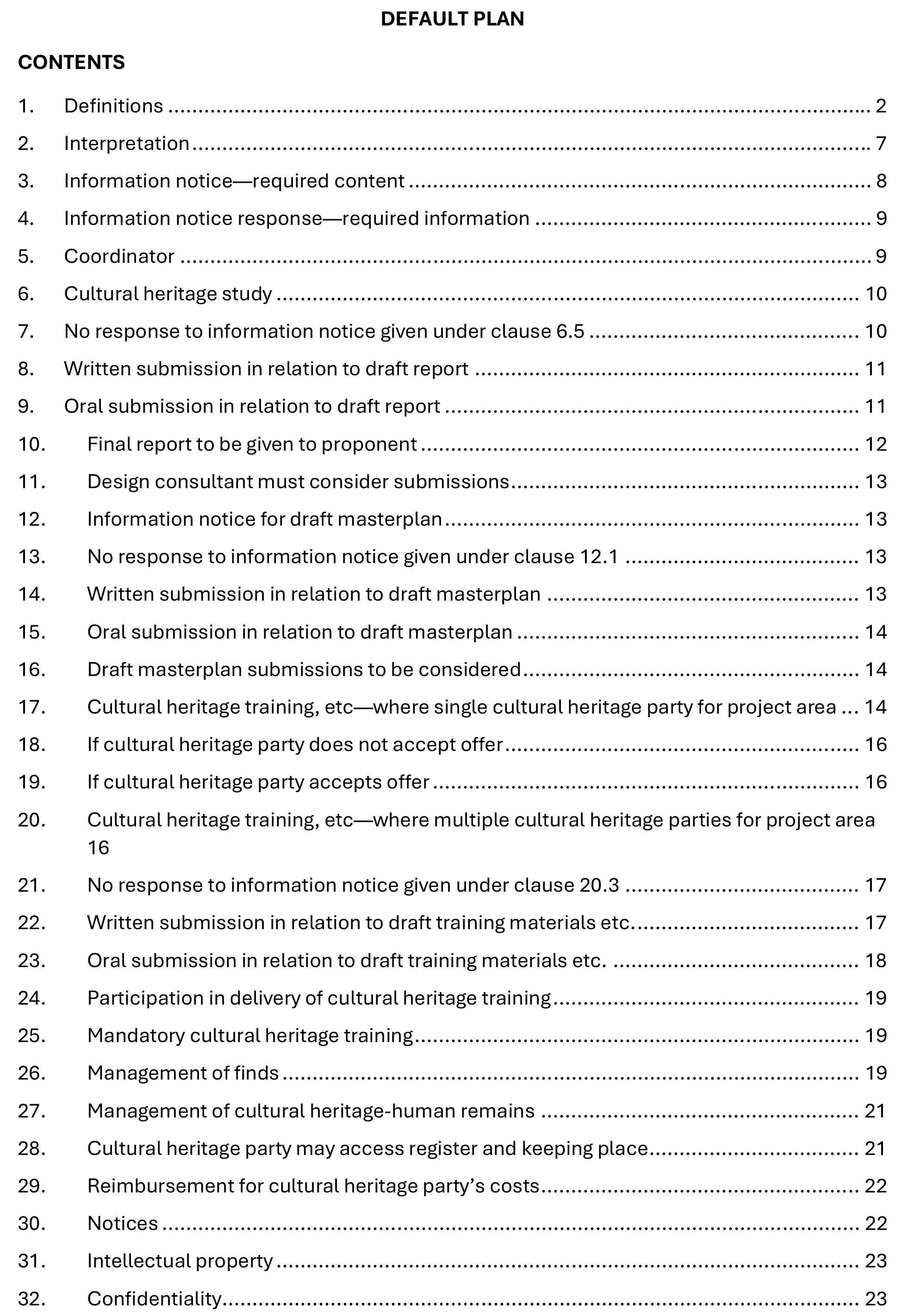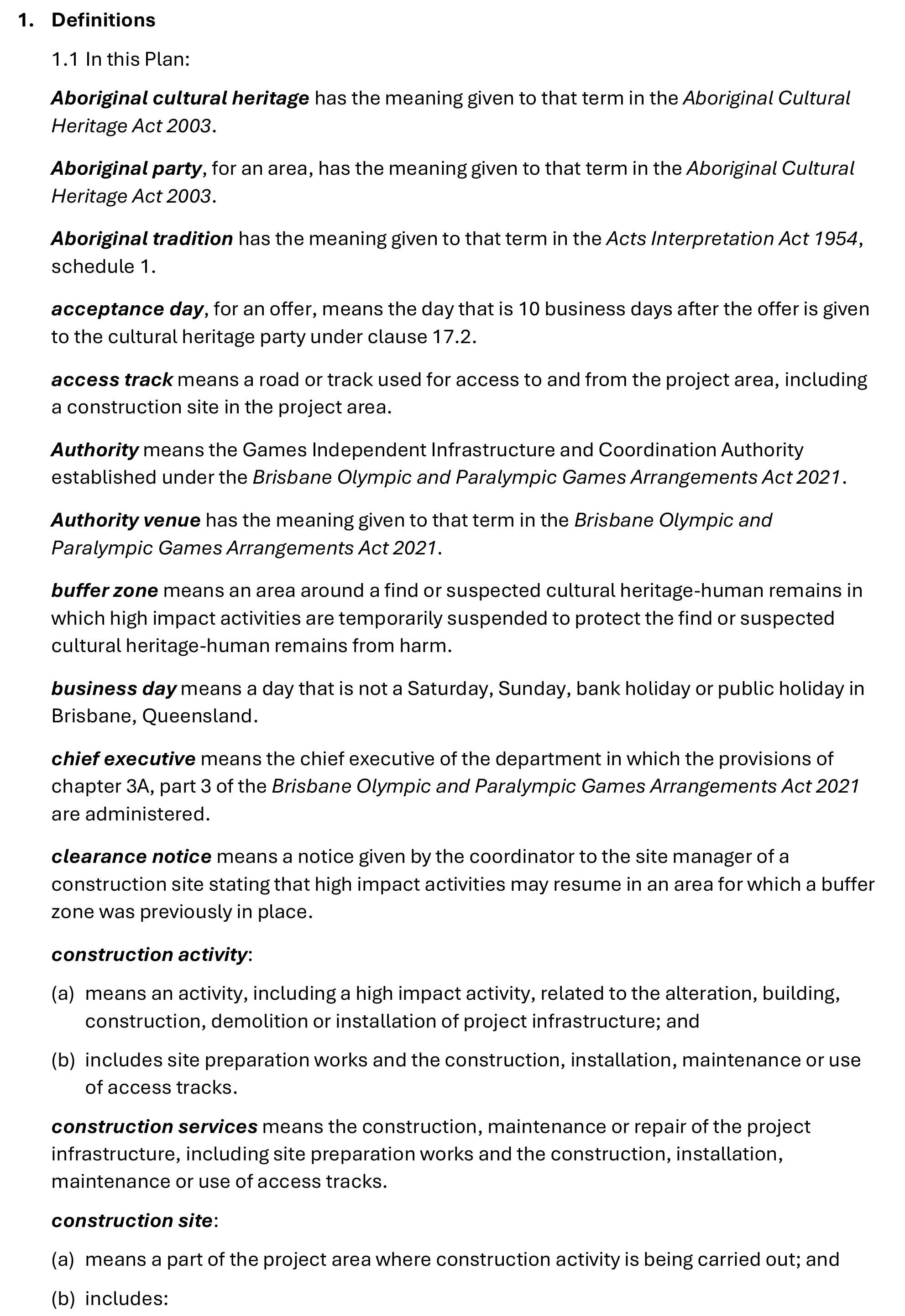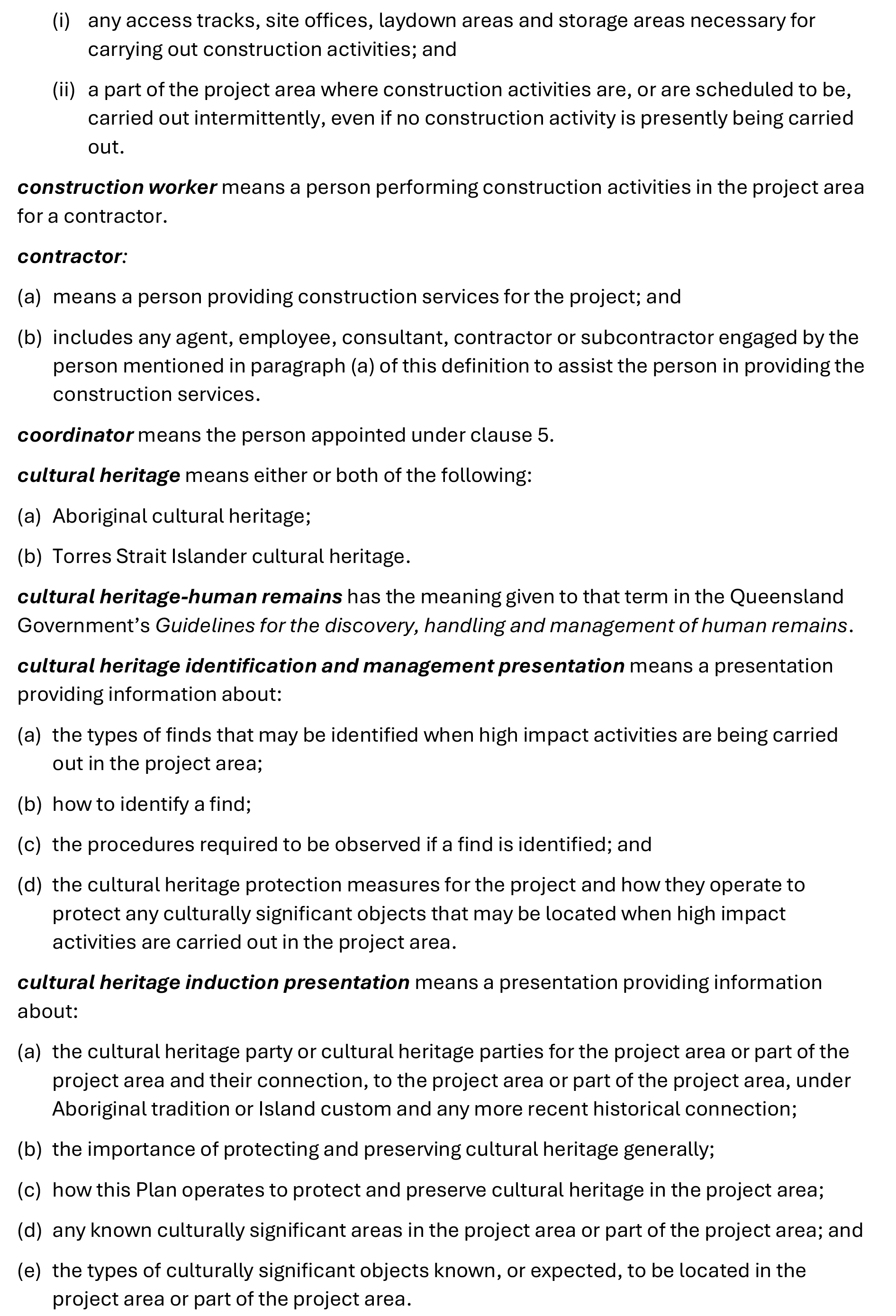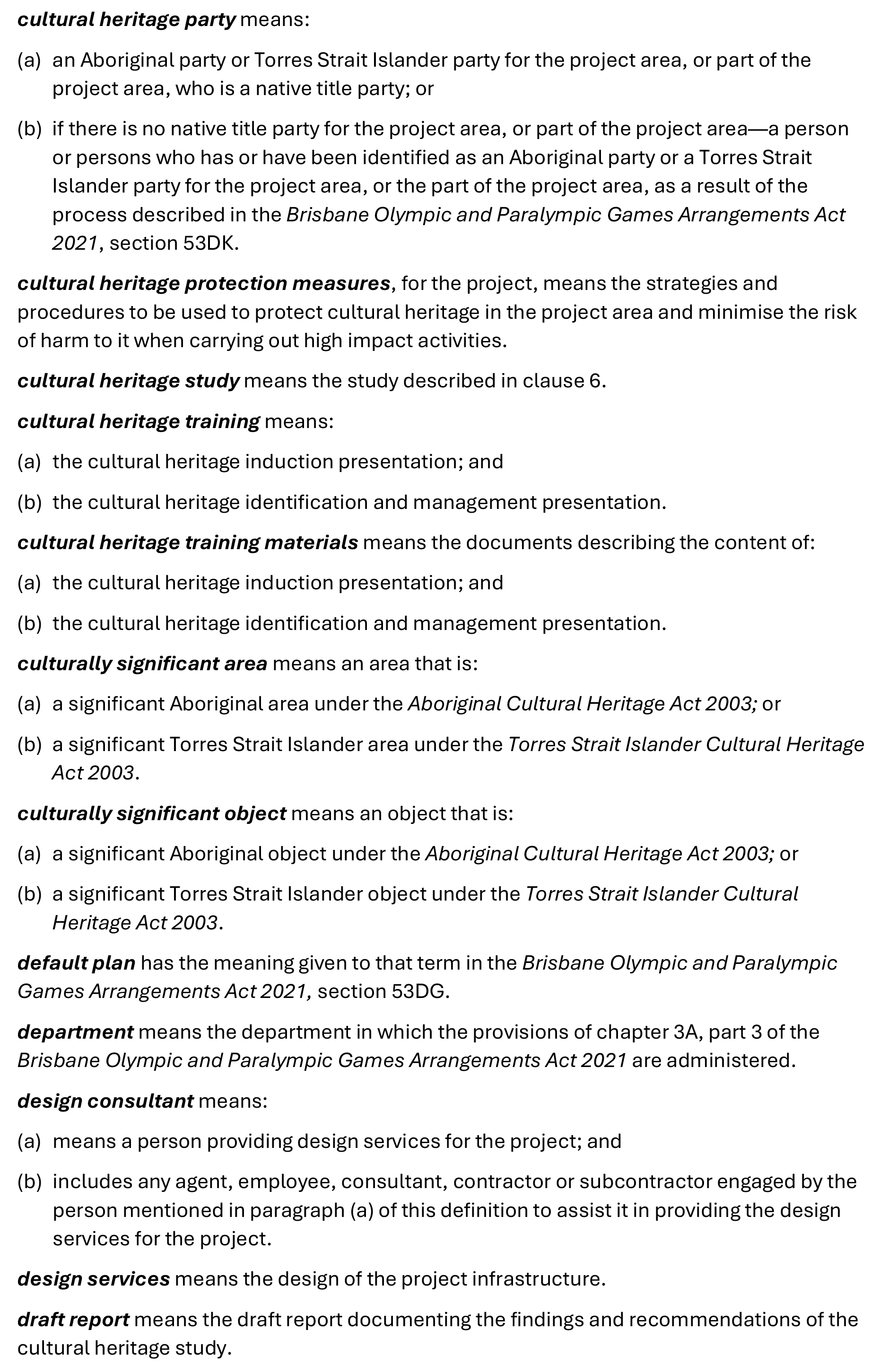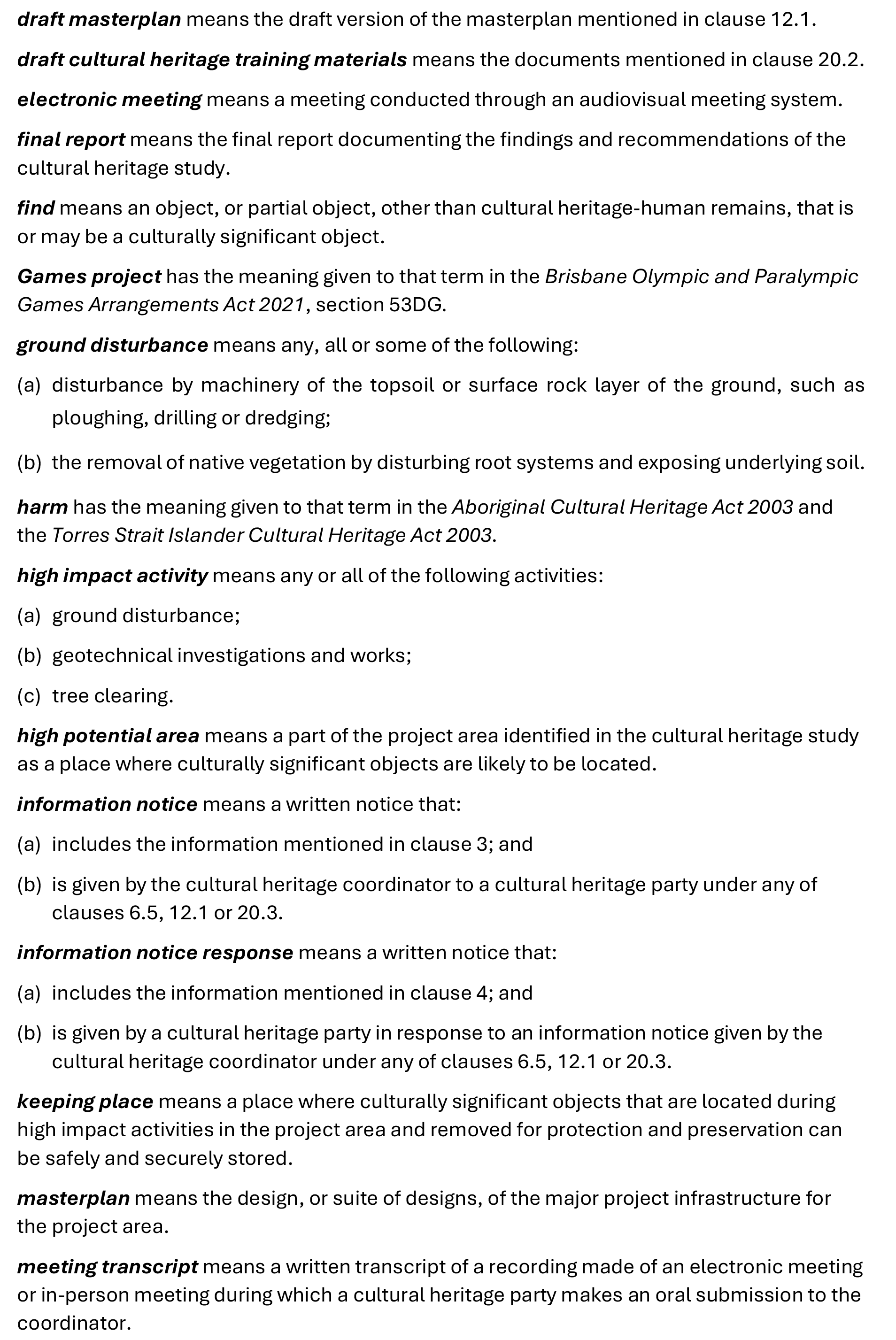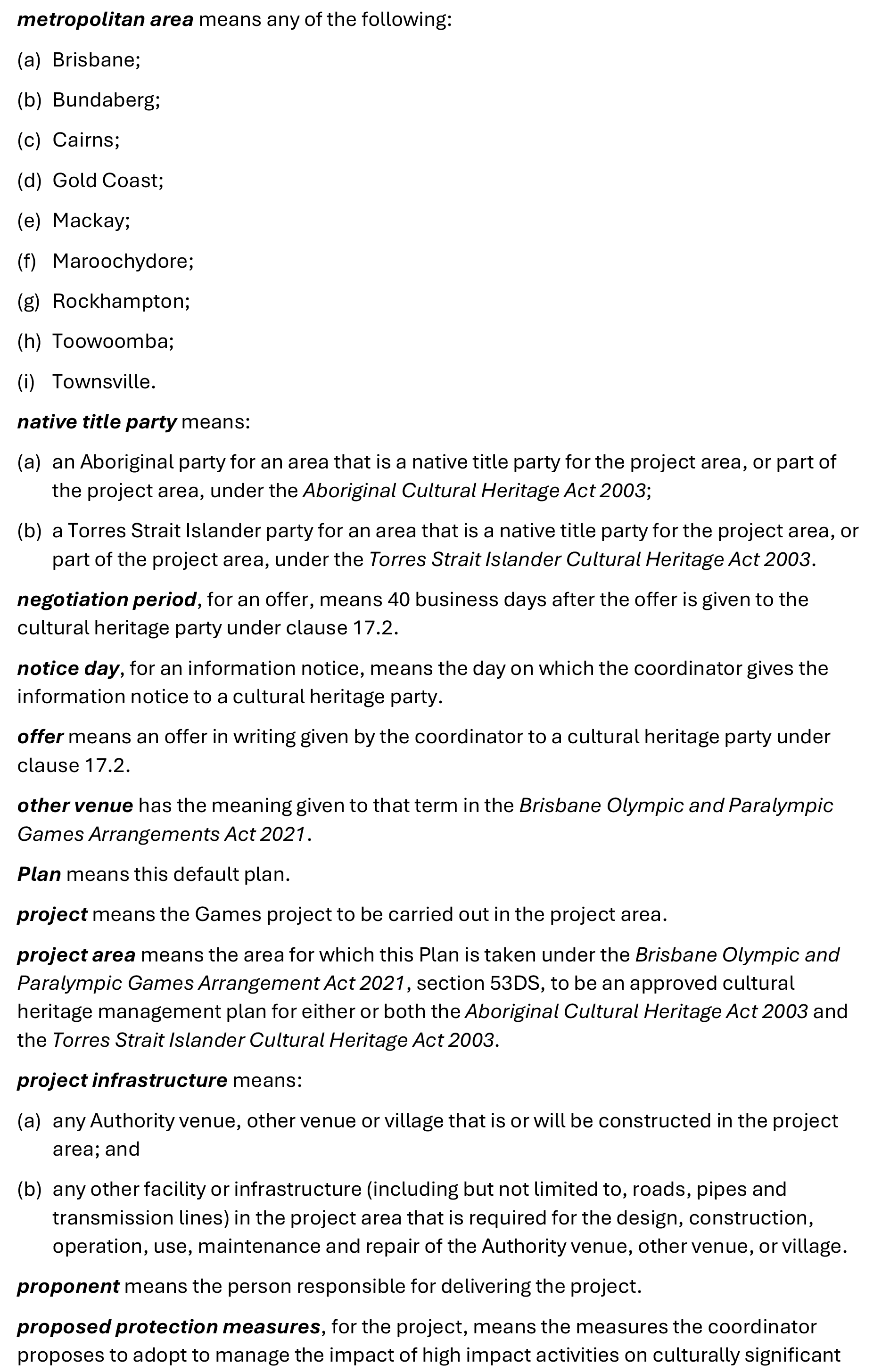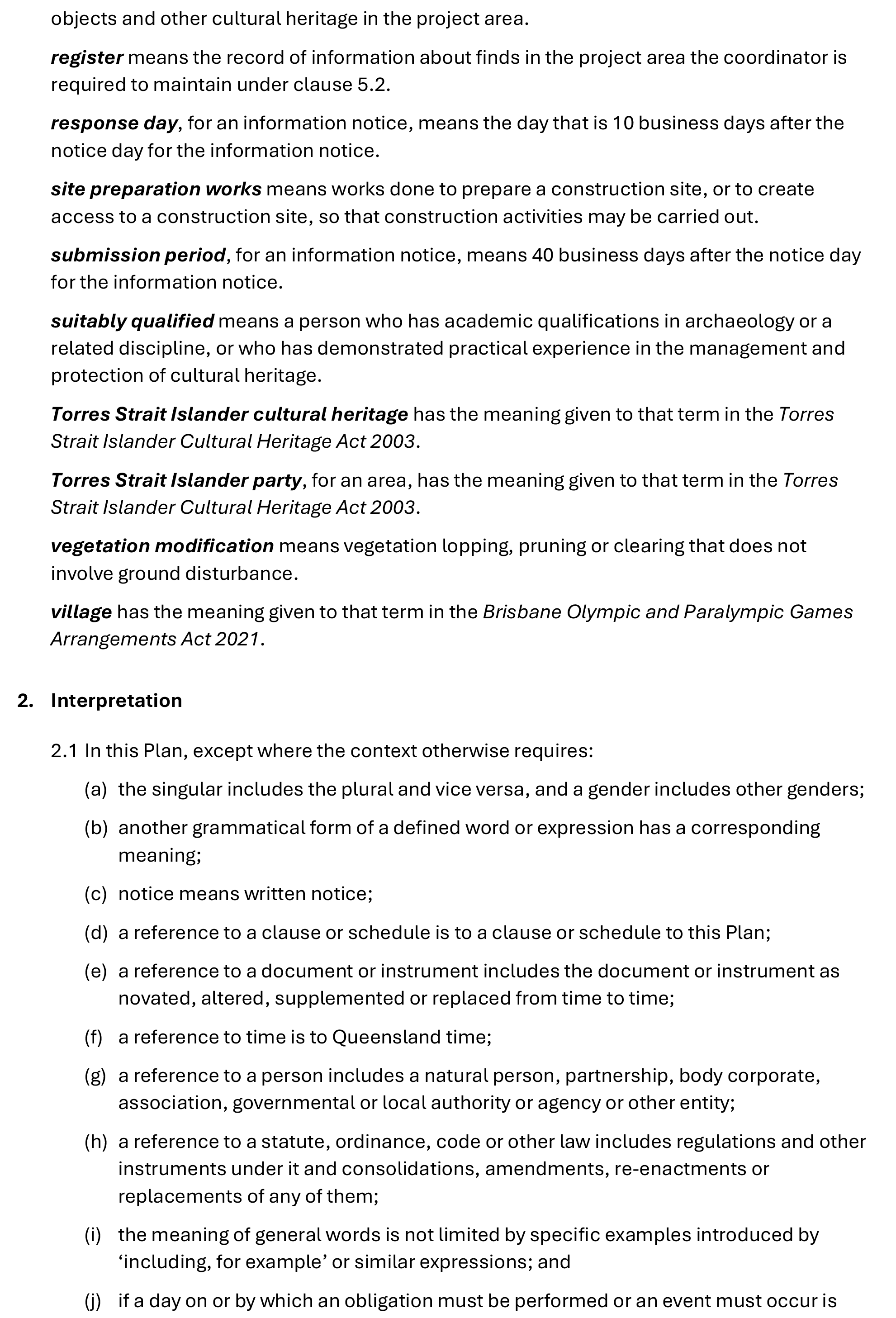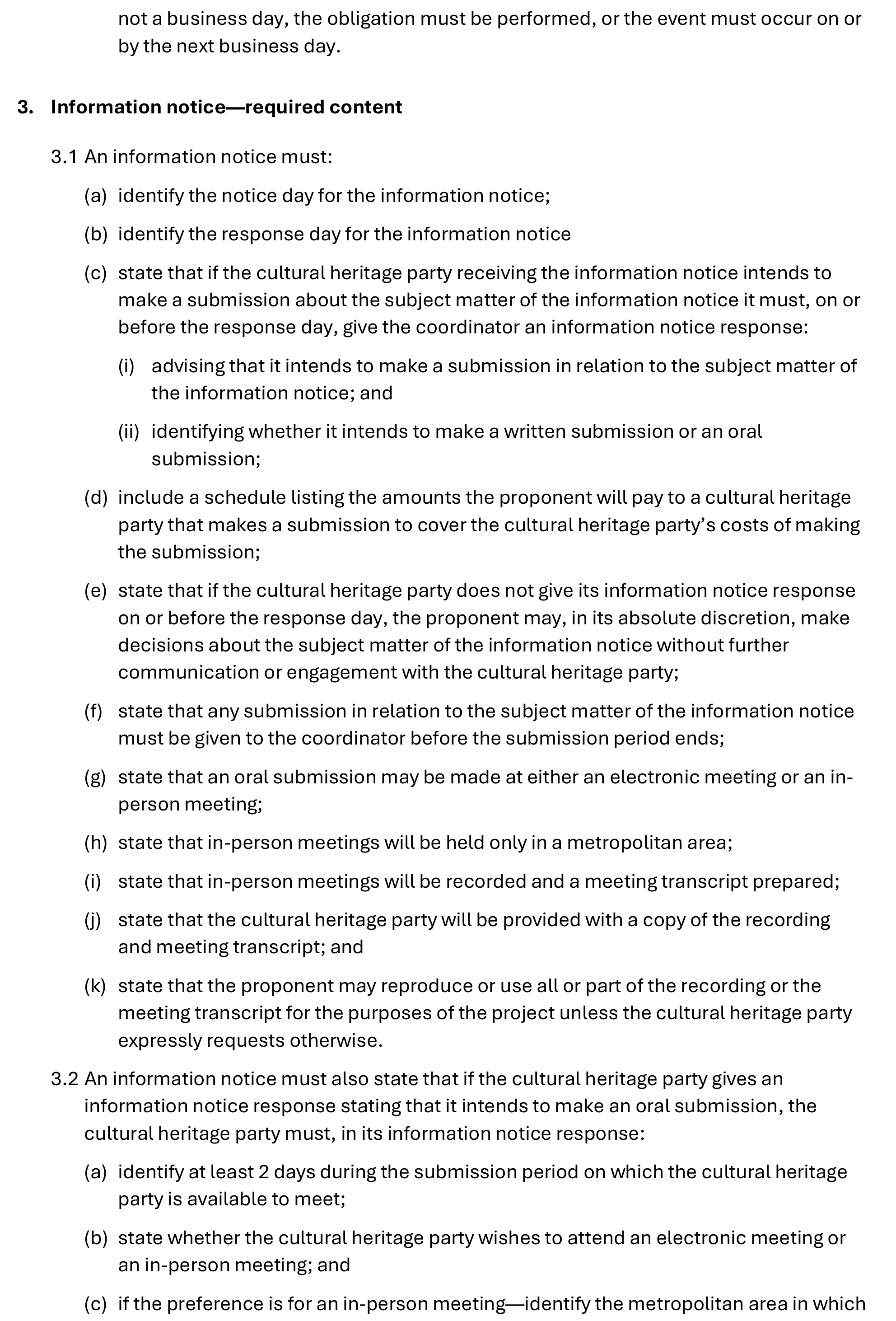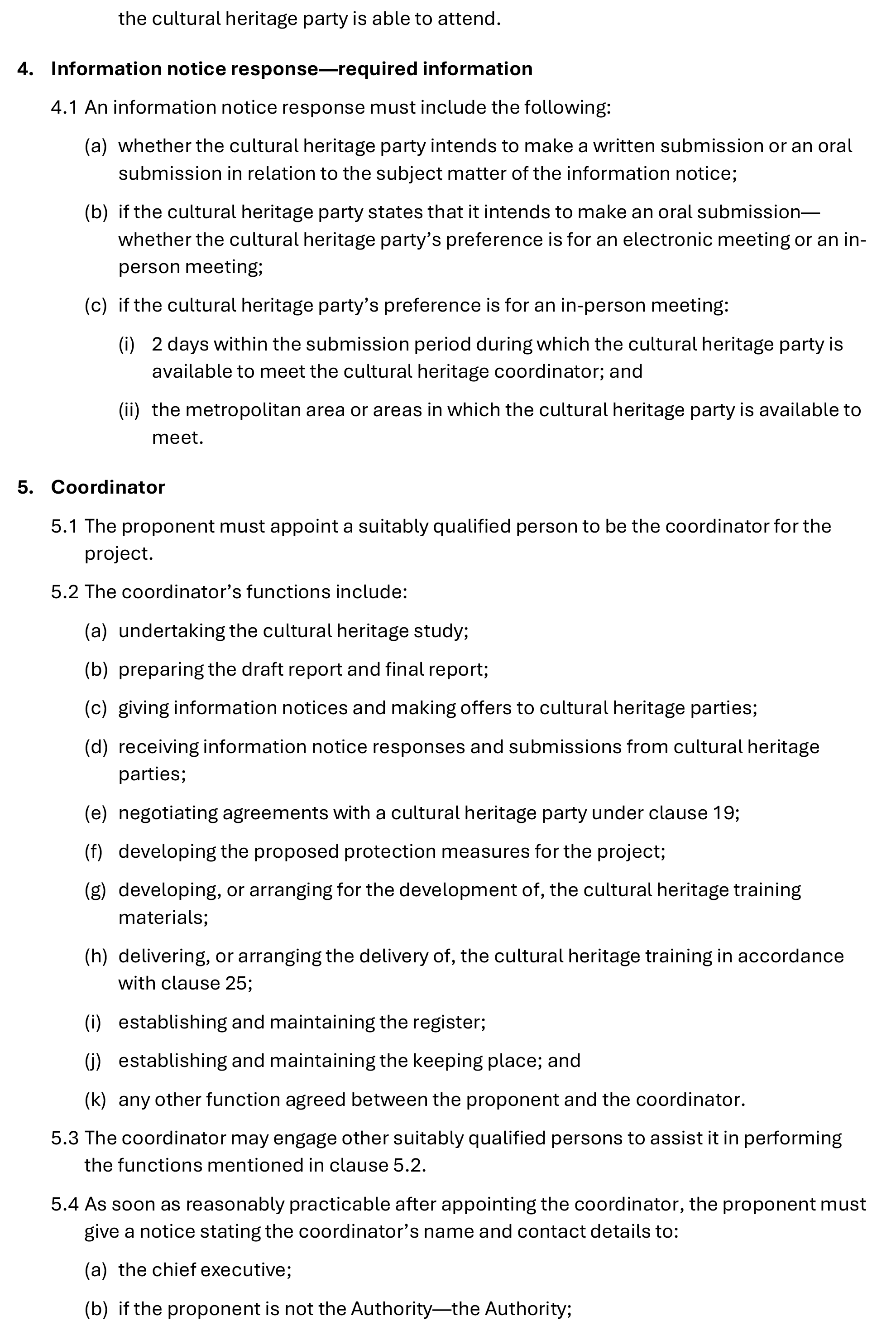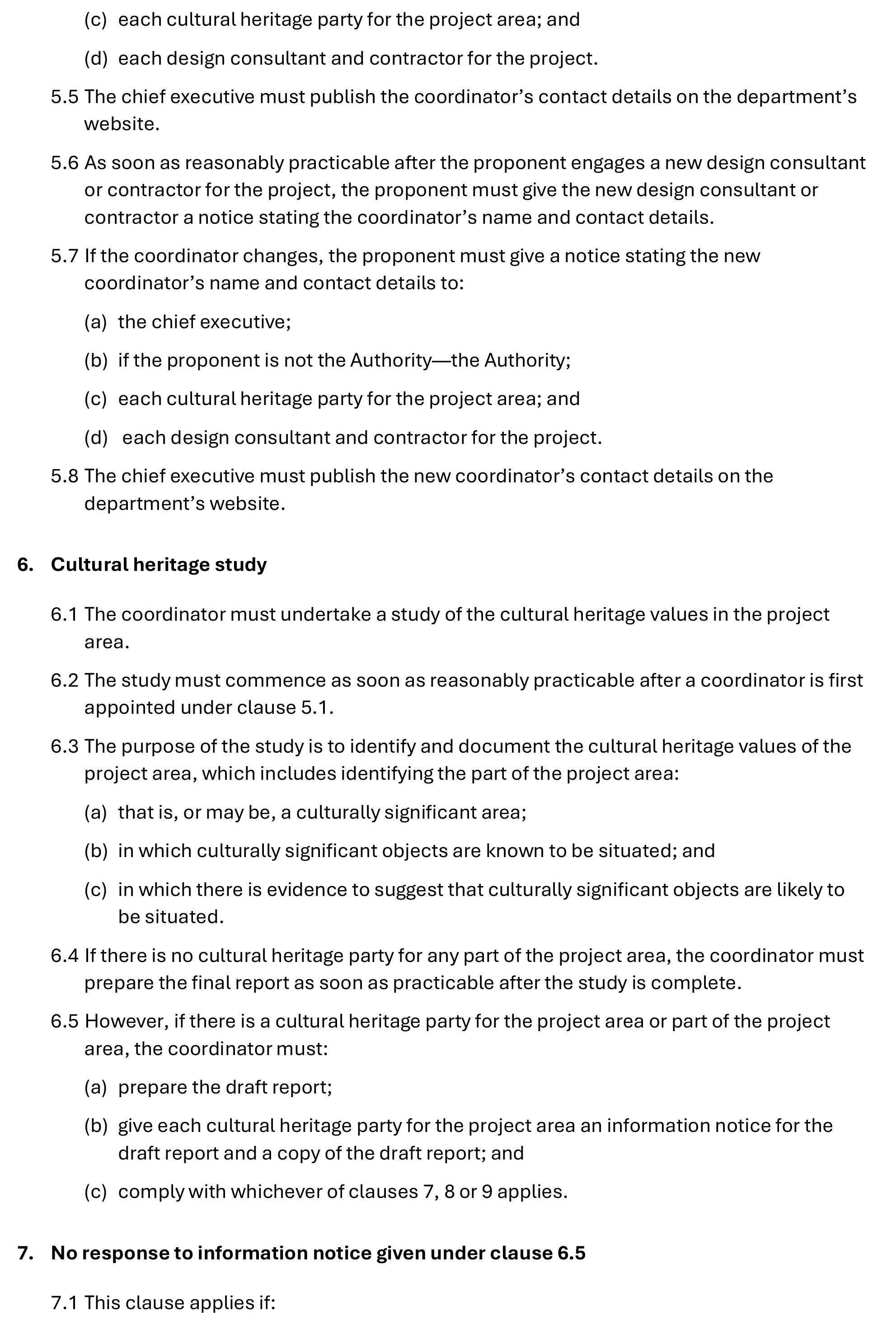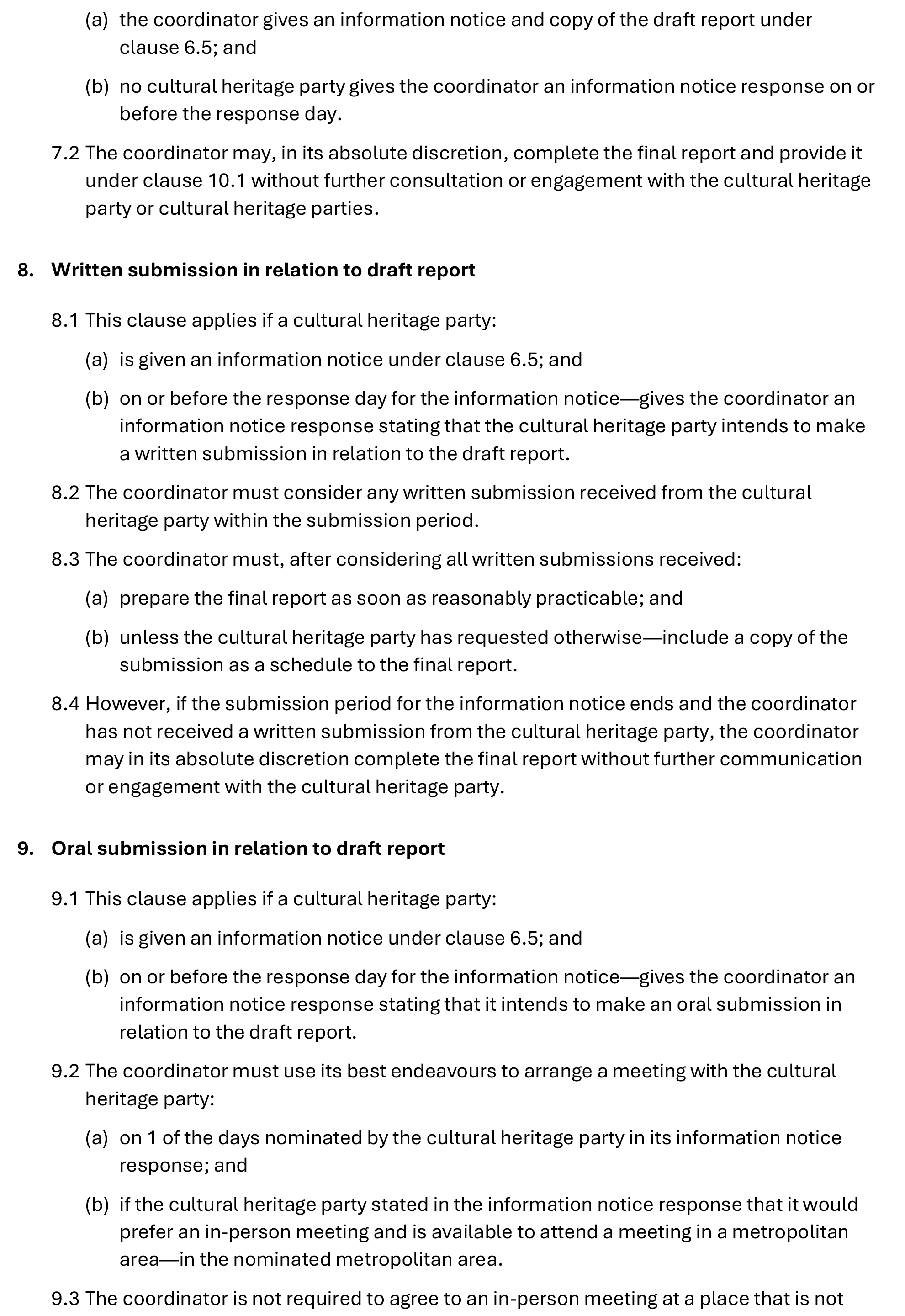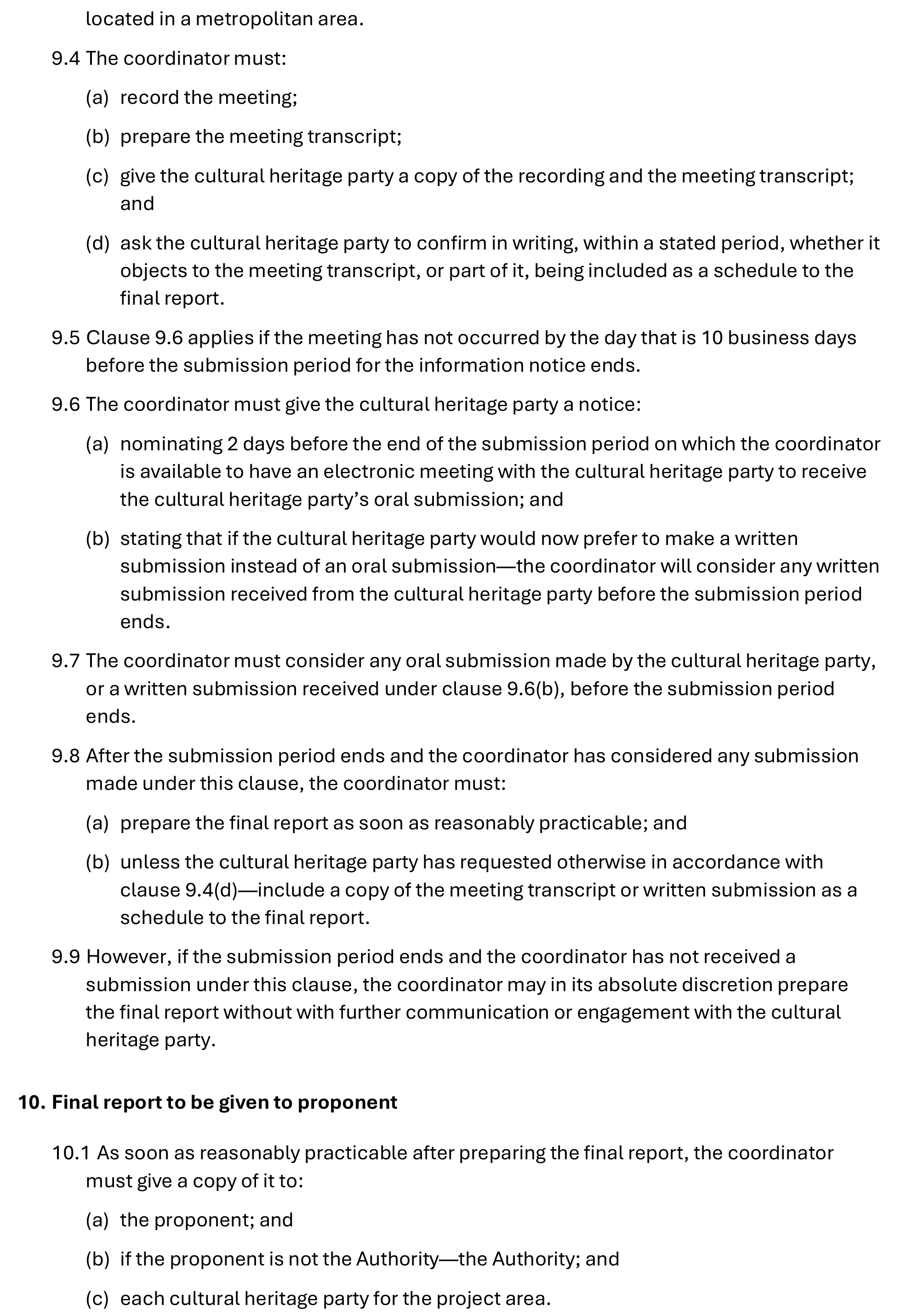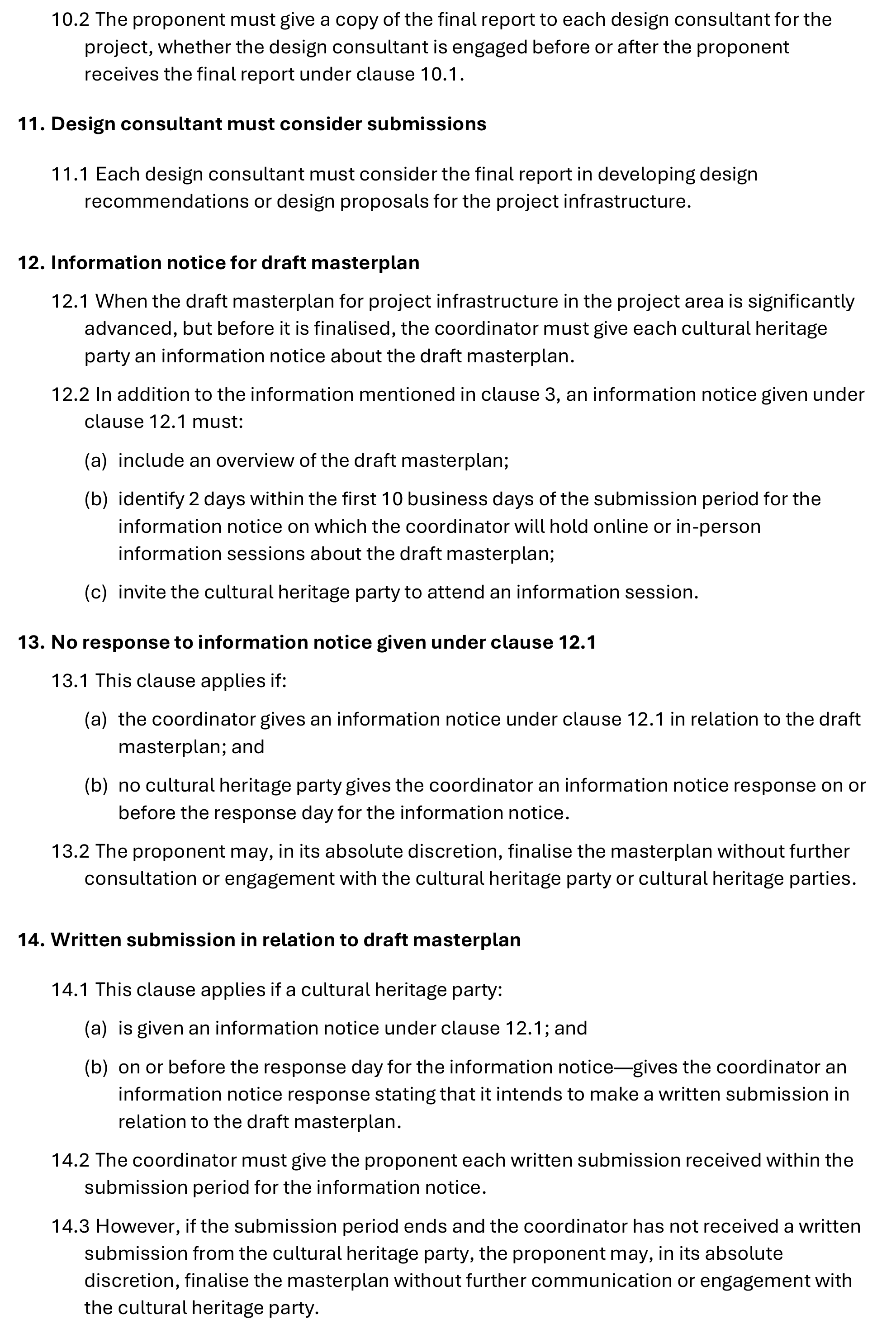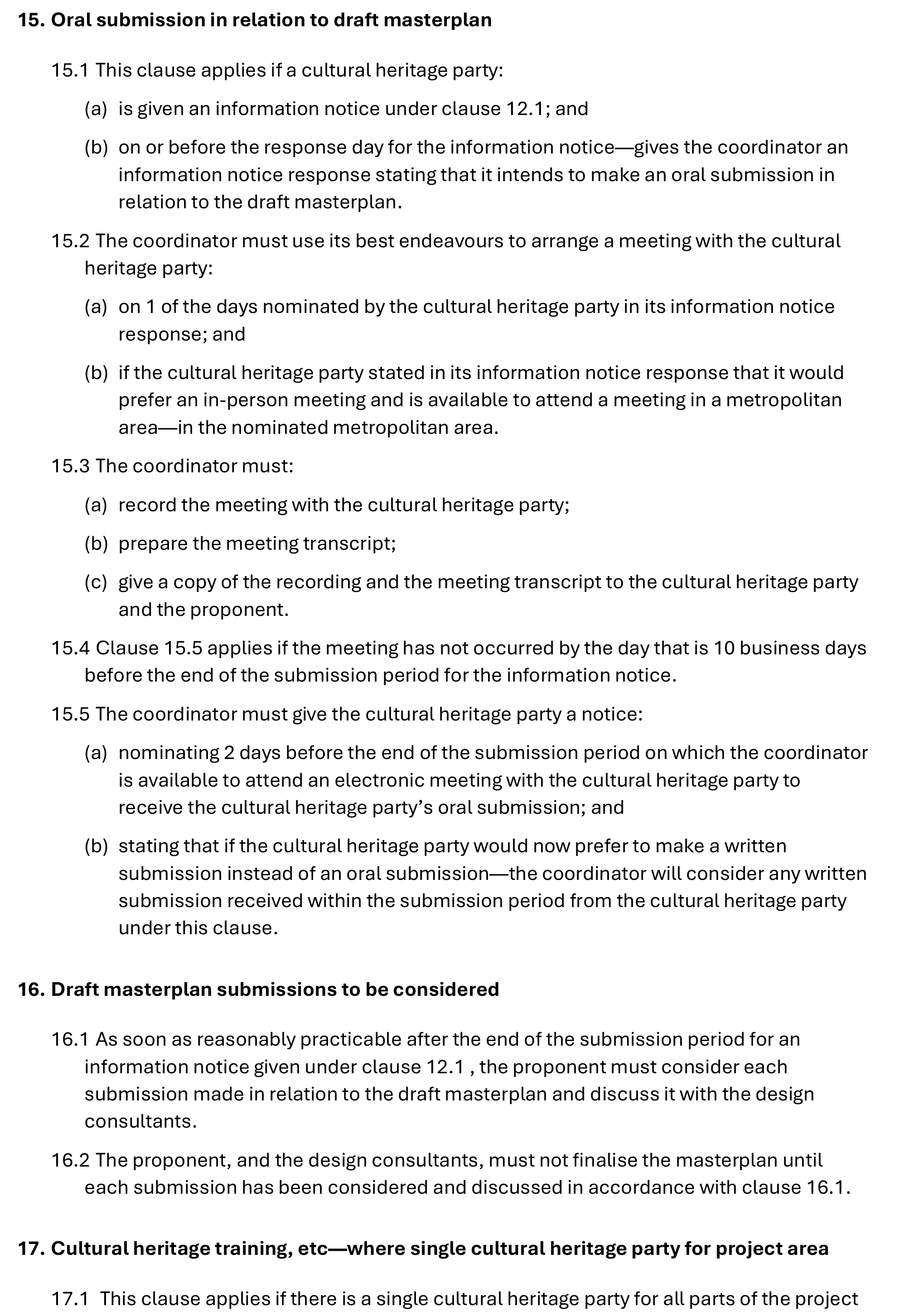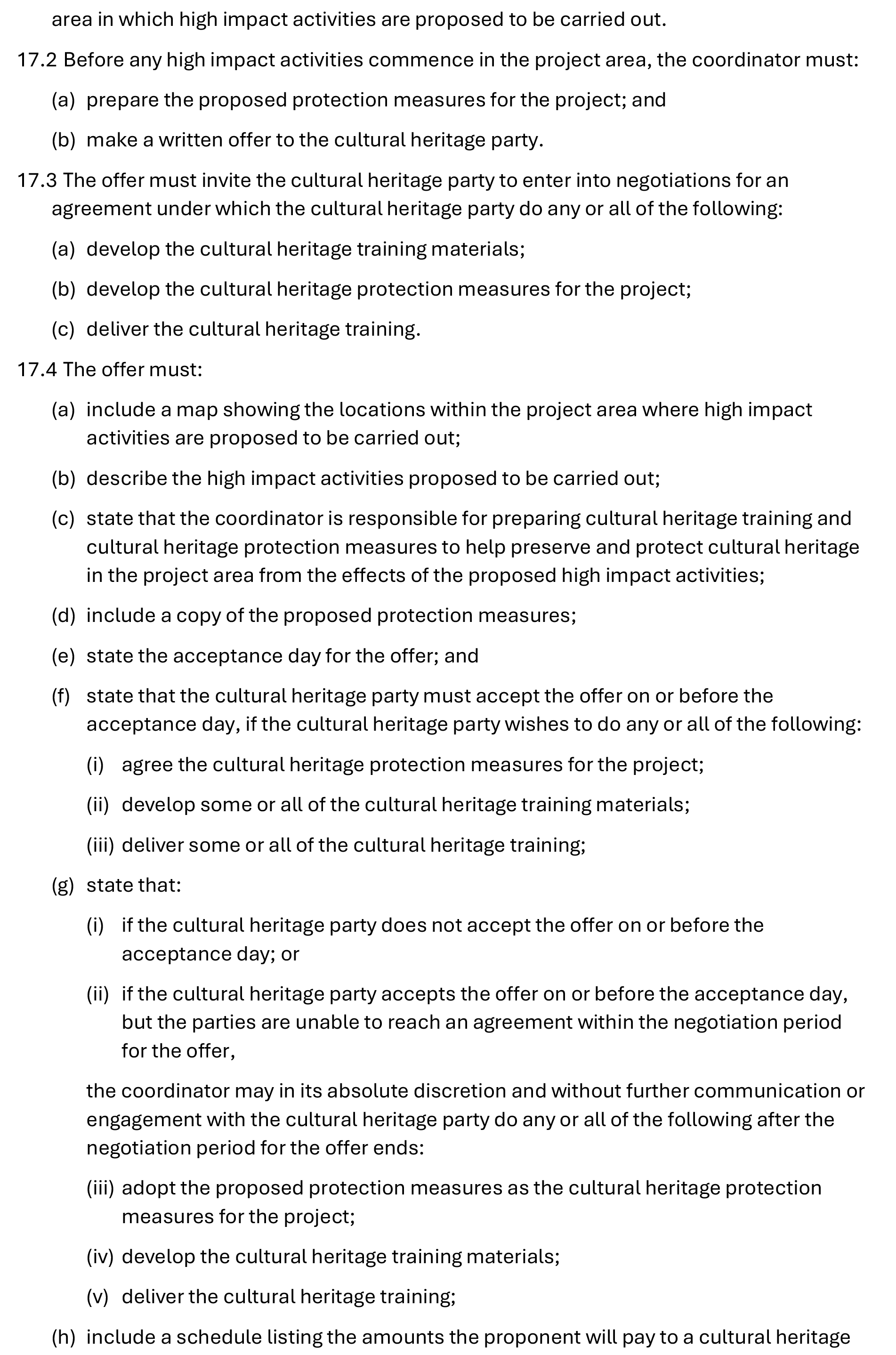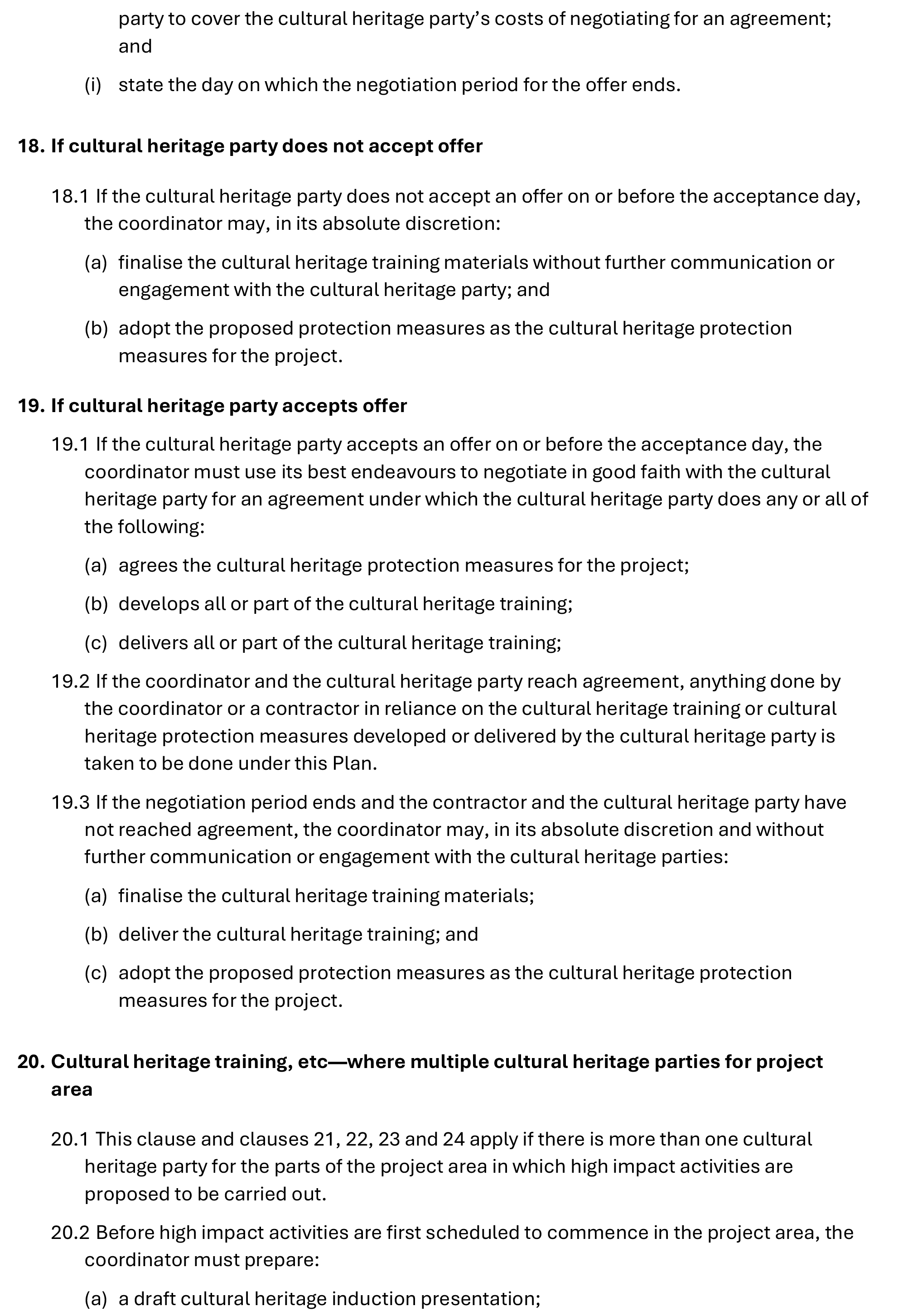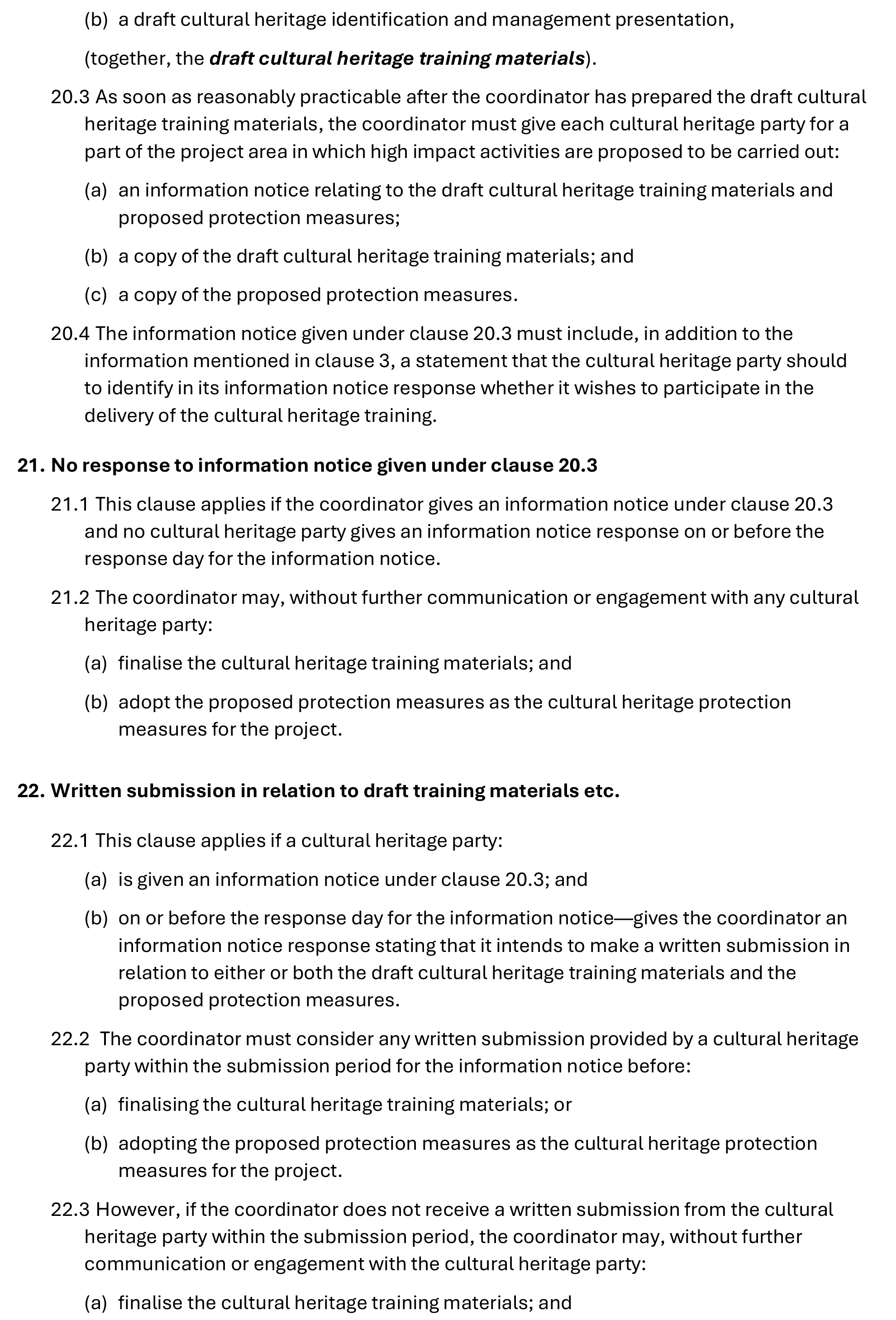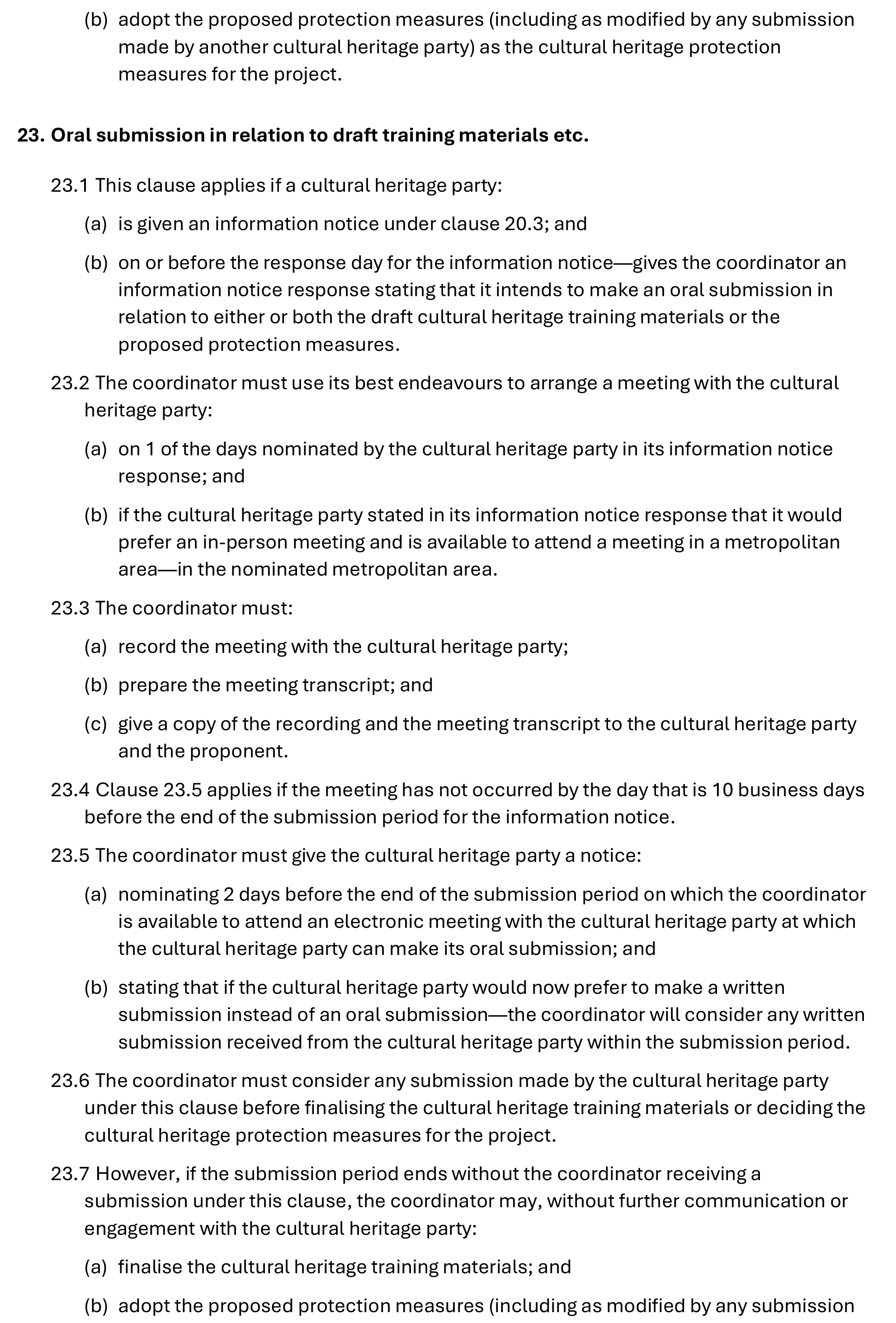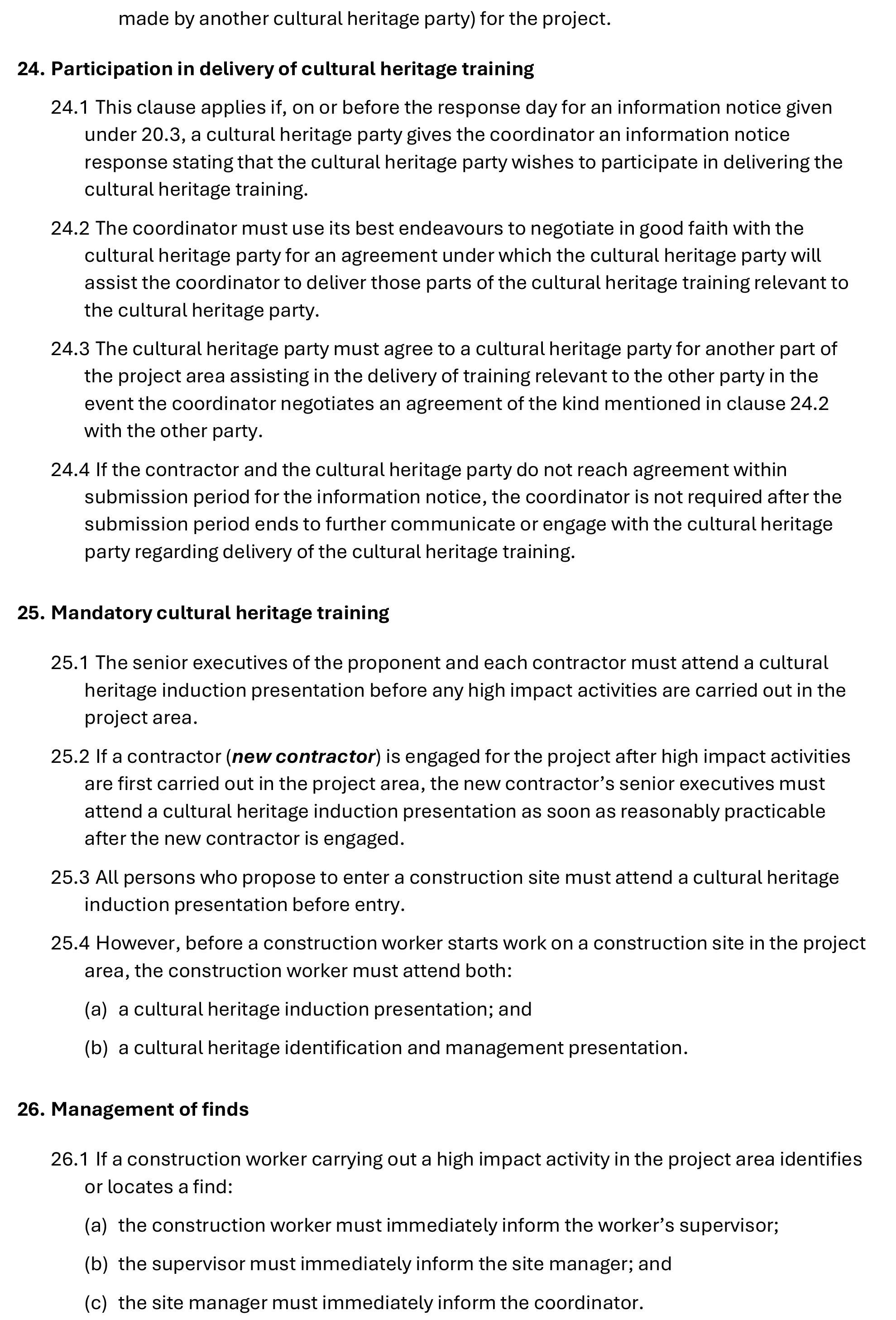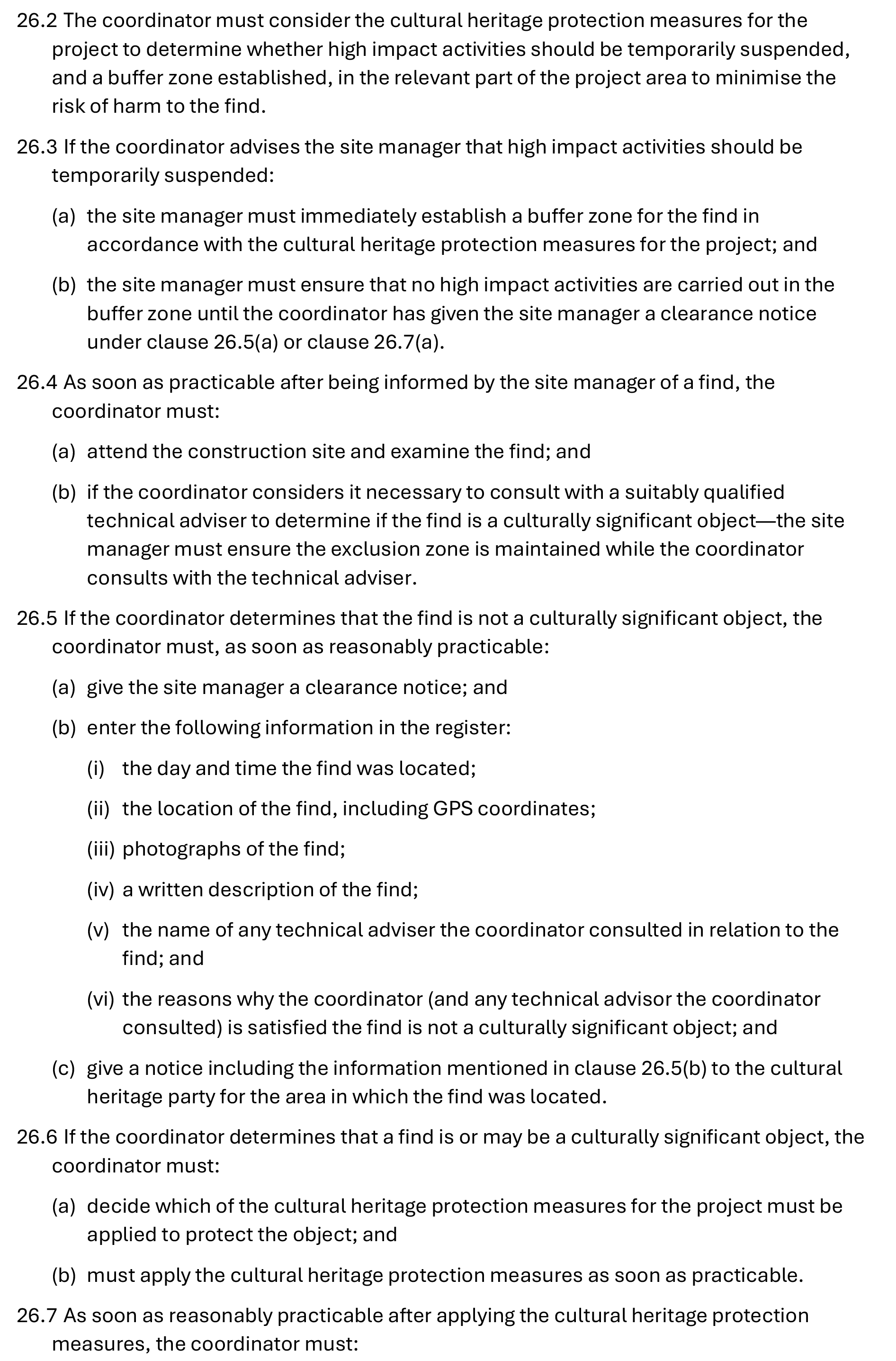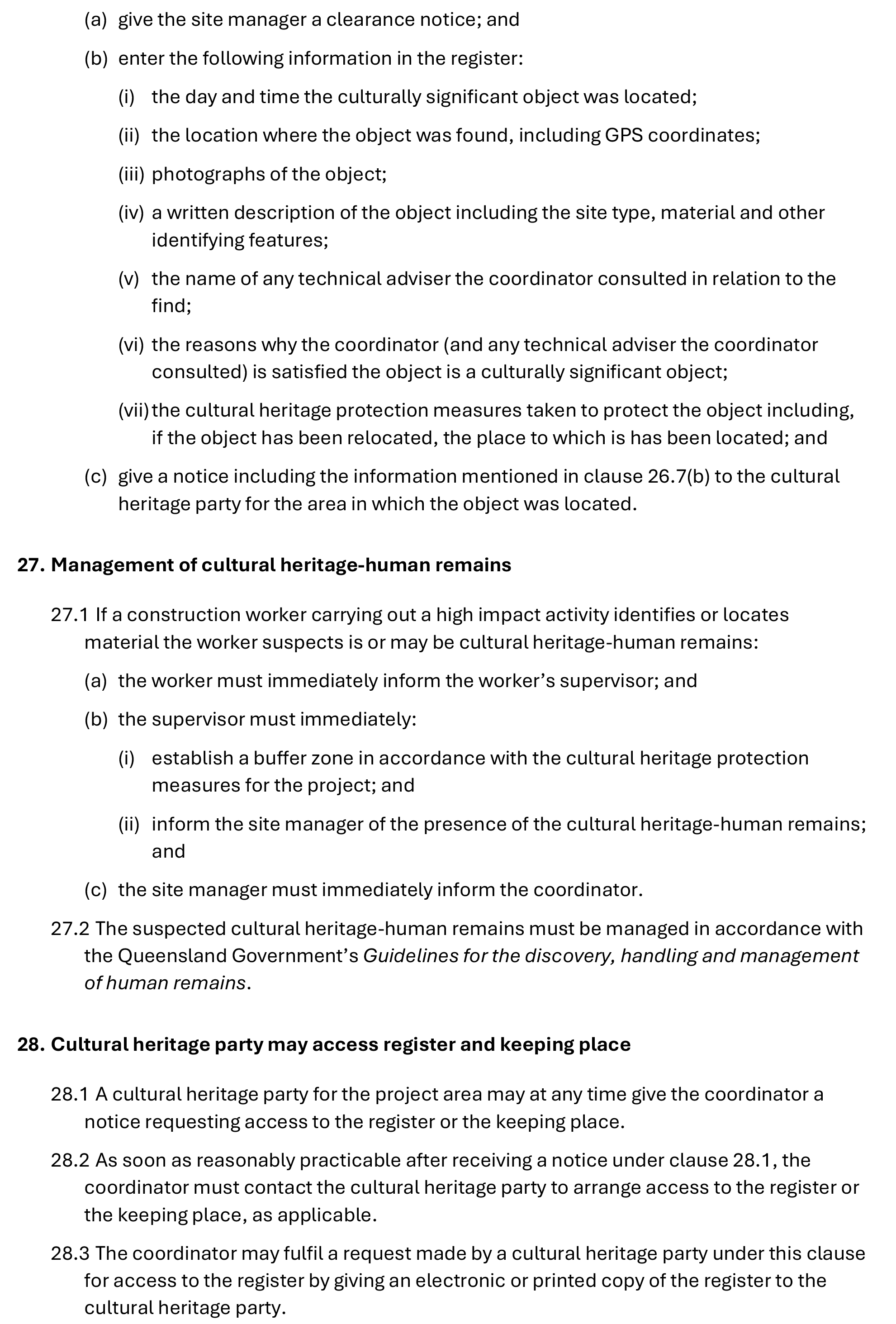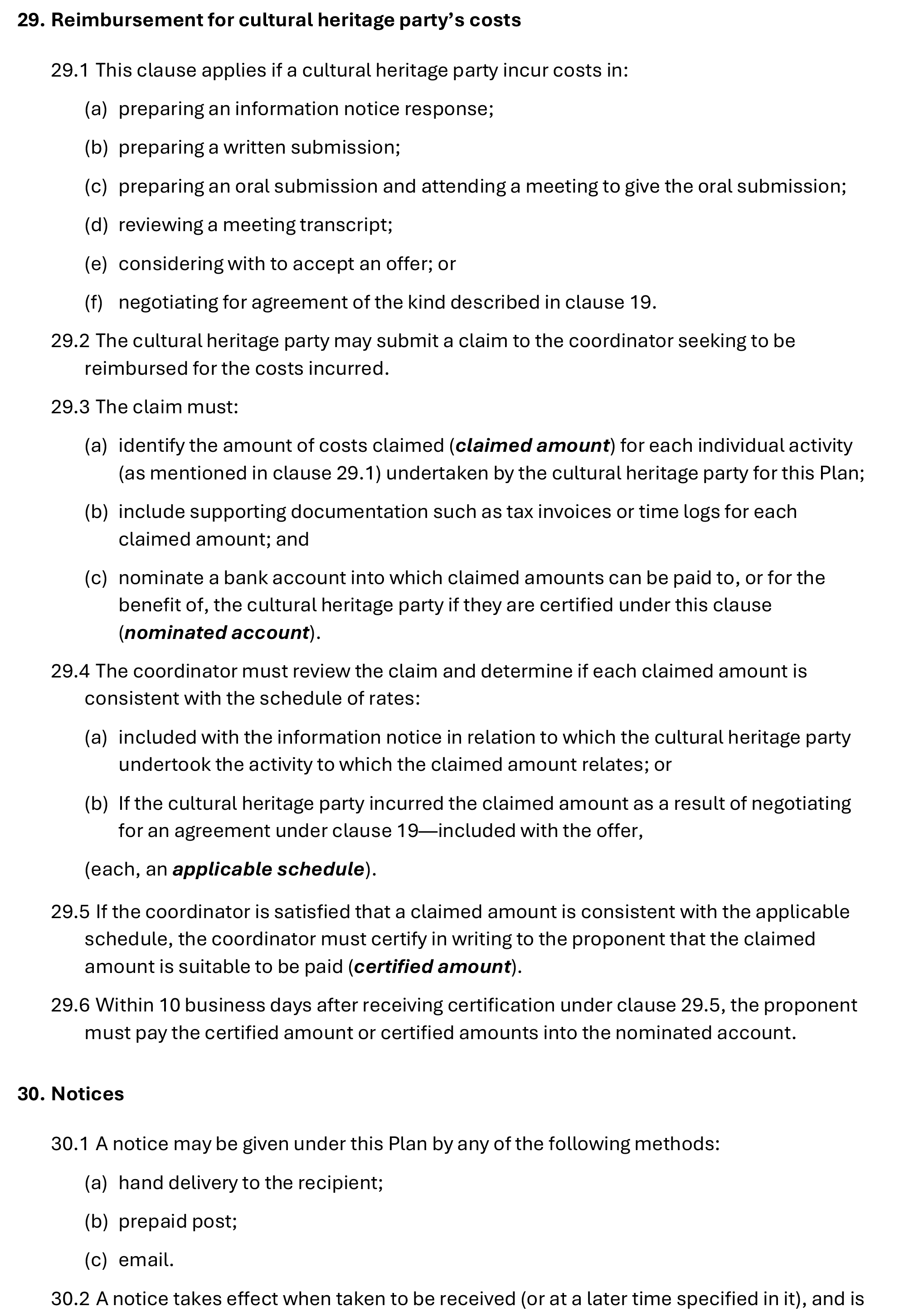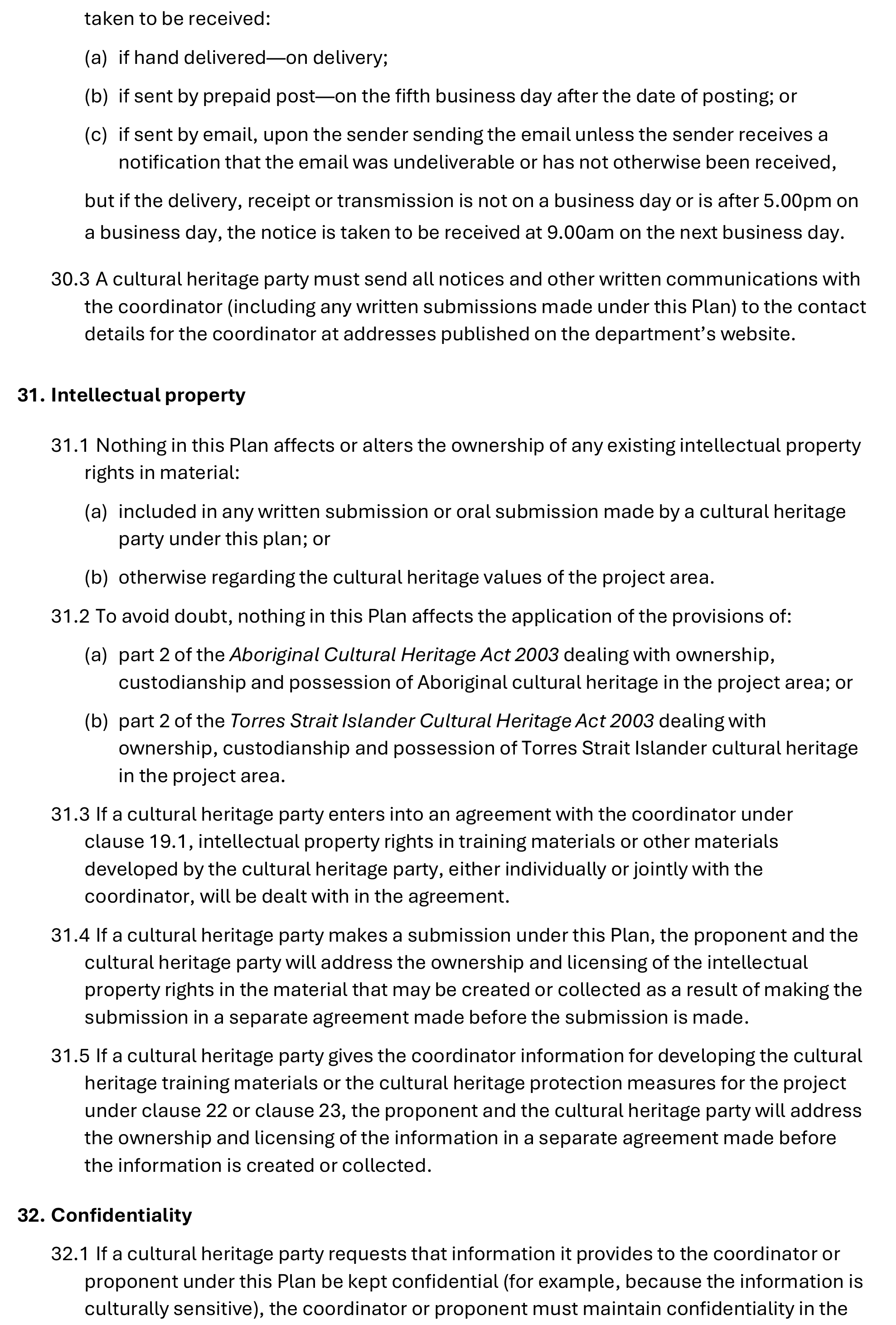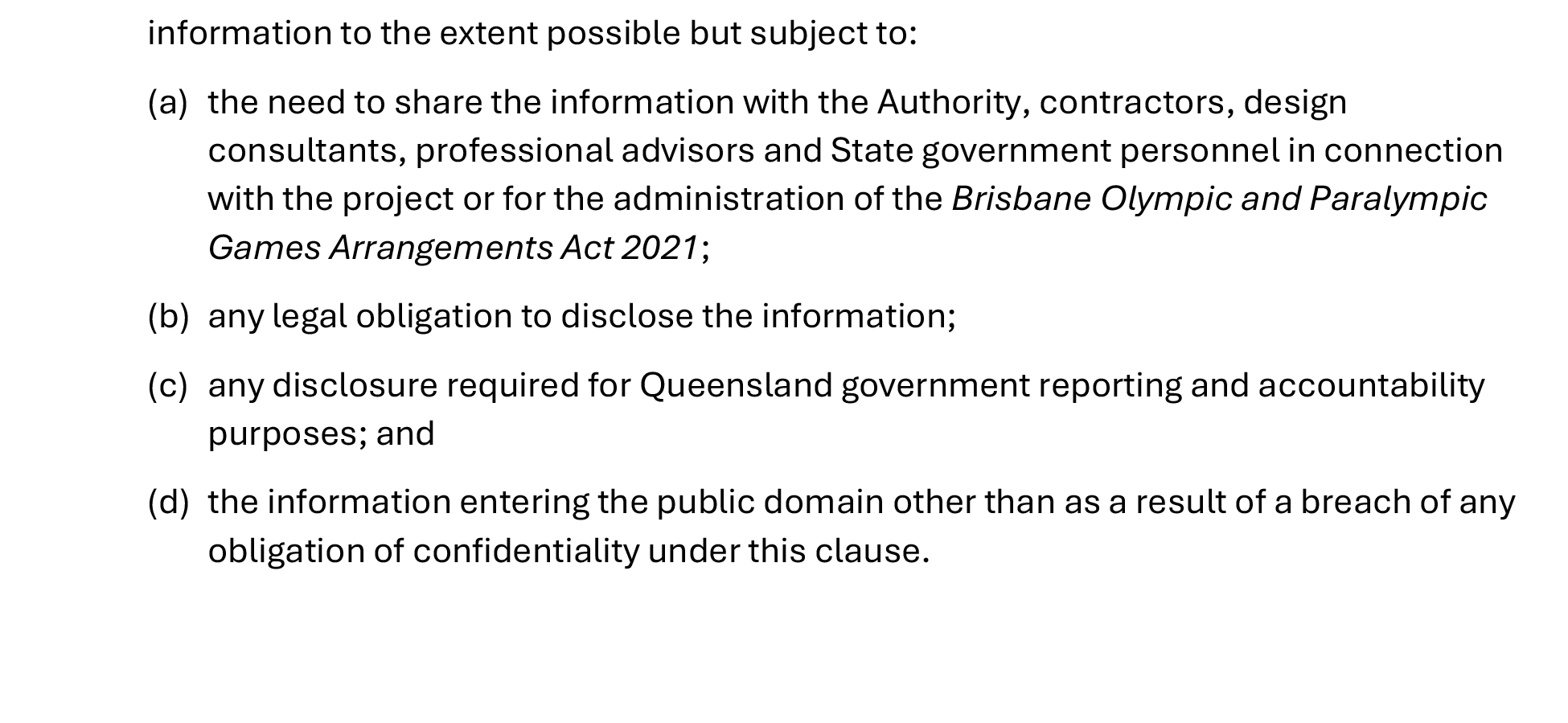An Act to establish an organising committee, and an independent games infrastructure and coordination authority, for the Brisbane 2032 Olympic and Paralympic Games and for related purposes
This Act may be cited as the Brisbane Olympic and Paralympic Games Arrangements Act 2021.
This Act commences on 20 December 2021.
The main purposes of this Act are—(a)to establish the Brisbane Organising Committee for the 2032 Olympic and Paralympic Games to plan, organise and deliver the games in accordance with the host contract; and(b)to establish the Games Independent Infrastructure and Coordination Authority to ensure Queensland’s readiness to successfully hostdeliver authority venues, and maximisemonitor the legacy and benefits fromdelivery of other venues, in time for the games.; and(c)to facilitate the timely delivery of authority venues, other venues and villages for the games; and(d)to maximise the legacy benefits from the games.
This Act binds all persons, including the State and, as far as the legislative power of the Parliament permits, the Commonwealth and the other States.
The dictionary in schedule 16 defines particular words used in this Act.
(1)A venue is a site or facility, prescribed by regulation, that is to or may fulfil operational or sports-related needs for the Brisbane 2032 Olympic and Paralympic Games.(2)A village is a site or facility, prescribed by regulation, that is to provide accommodation and related facilities for competitors, team officials and other team personnel for the Brisbane 2032 Olympic and Paralympic Games.
(1)A site or facility mentioned in schedule 1, column 1 is an authority venue for the Brisbane 2032 Olympic and Paralympic Games.(2)The games-related use for each authority venue is the use stated for the venue in schedule 1, column 2.(3)The legacy use for each authority venue is the use stated for the venue in schedule 1, column 3.
(1)A site or facility mentioned in schedule 2, column 1 is an other venue for the Brisbane 2032 Olympic and Paralympic Games.(2)The games-related use for each other venue is the use stated for the venue in schedule 2, column 2.(3)The legacy use for each other venue is the use stated for the venue in schedule 2, column 3.
(1)A site or facility mentioned in schedule 3, column 1 is a village for the Brisbane 2032 Olympic and Paralympic Games.(2)The games-related use for each village is the use stated for the village in schedule 3, column 2.(3)The legacy use for each village is the use stated for the village in schedule 3, column 3.
5DDelivery of venues and villages
Delivery, of an authority venue, other venue or village, is both of the following—(a)completing the detailed design and construction of the venue or village for its games-related use, including any temporary structures;(b)ensuring the venue or village is fit for its games-related use.
The Brisbane Organising Committee for the 2032 Olympic and Paralympic Games (the corporation) is established.
(1)The corporation—(a)is a body corporate; and(b)has a seal; and(c)may sue and be sued in its corporate name.(2)The corporation does not represent the State.
(1)The corporation is—(a)a statutory body under the Financial Accountability Act 2009; and(b)a statutory body under the Statutory Bodies Financial Arrangements Act 1982; andThe Statutory Bodies Financial Arrangements Act 1982, part 2B sets out the way that Act affects the corporation’s powers.(c)a unit of public administration under the Crime and Corruption Act 2001.(2)However, the Crime and Corruption Act 2001 does not apply in relation to a director who is a member of the Parliament of the Commonwealth to the extent a matter under that Act—(a)involves conduct of, or in relation to, that director, or another director, in their capacity as a director of the corporation; or(b)otherwise relates to the corporation or the board.
(1)The main function of the corporation is to undertake and facilitate the organisation, conduct, promotion and commercial and financial management of the Brisbane 2032 Olympic and Paralympic Games.(2)Without limiting subsection (1), the corporation has the following functions—(a)to become a party to the host contract;(b)to comply with the corporation’s obligations under the host contract;(c)to organise accommodation and transportation for athletes, officials and media personnel;(d)to manage the preparation and operation of venues and facilities for the sports program;(e)to organise events and ceremonies such as the Olympic and Paralympic torch relays, the opening and closing ceremonies and the cultural olympiad;(f)to manage the ticketing program;(g)to recruit, retain and organise volunteers;(h)to establish a marketing program in consultation with the International Olympic Committee and the Australian Olympic Committee;(i)to support the International Olympic Committee and the host broadcaster in relation to broadcasting and to make arrangements for the provision of other information services.(3)The corporation also has—(a)the functions given to it under this Act or another Act; and(b)any other function, related to its main function under subsection (1), prescribed by regulation.
10Requirements for performance of functions
(1)In performing its functions, the corporation must—(a)have regard to the financial resources of the corporation and the State available for the Brisbane 2032 Olympic and Paralympic Games; and(b)have regard to, and comply with any relevant requirements in, the following documents—(i)the Olympic Charter;(ii)the document called ‘IPC handbook’ published by the International Paralympic Committee;(iii)the document called ‘World anti-doping code’ published by the World Anti-Doping Agency;(iv)the document called ‘Athletes’ rights and responsibilities declaration’ developed by the Athletes’ Commission of the International Olympic Committee;(v)the document called ‘Olympic movement code on the prevention of the manipulation of competitions’ published by the International Olympic Committee; and(c)use its best endeavours to avoid creating liabilities that will not be, or are likely not to have been, satisfied before the corporation is dissolved under part 5; and(d)ensure goods and services are procured in accordance with the Queensland Government’s policy about procurement, including procurement from Indigenous businesses; and(e)cooperate with the authority in good faith.; and(f)have regard to decisions and advice of the leadership group mentioned in section 55A.(2)For subsection (1)(d), the Queensland Government’s policy about procurement does not apply to the extent it is inconsistent with the host contract.(3)In this section—World Anti-Doping Agency means the not-for-profit foundation of that name established in 1999 in Lausanne, Switzerland.
(1)The corporation must enter into an agreement with the Minister (each a funding agreement).(2)The funding agreement must provide for the financial monitoring of the corporation by the Minister, including reporting requirements.(3)The corporation must comply with its obligations under the funding agreement.(4)This section does not limit the obligations of the corporation under the Financial Accountability Act 2009.
(1)The corporation has all the powers of an individual.(2)The corporation also has any other power given to it under this Act or another Act.
12Performing functions and exercising powers inside and outside Queensland
The corporation may perform its functions, and exercise its powers, inside or outside Queensland.
(1)A document executed by the corporation, other than a document required to be sealed, is sufficiently executed if it is signed by—(a)the chief executive officer; or(b)the president; or(c)another person authorised by the board.(2)A document executed by the corporation under seal is sufficiently executed if it is sealed in the way authorised by the board and signed by a person mentioned in subsection (1).
There is a board of directors of the corporation (the board).
The functions of the board are—(a)to ensure the corporation performs its functions in a proper, effective and efficient way; and(b)any other function given to the board under this Act.
(1)The board has the power to do anything necessary or convenient to be done in performing its functions.(2)Anything done in the name of, or for, or with the authority of, the board is taken to have been done by the corporation.
(1)The board consists of the following persons (each a director)—(a)up to 3 persons nominated by the Minister as independent directors in accordance with section 18;See also section 25 in relation to the president of the board.(b)1 person nominated by the Minister as a representative of the Queensland Government in accordance with section 19;See also section 26 in relation to the vice president of the board.(c)1 person nominated by the Prime Minister in accordance with section 19;(d)1 person nominated by the Lord Mayor in accordance with section 19;(e)1 person nominated by the mayor of the Gold Coast City Council in accordance with section 19;(f)1 person nominated by the mayor of the Sunshine Coast Regional Council in accordance with section 19;(g)1 person who—(i)has competed for Australia at either or both of the 2 Olympic Games held most recently before the person’s appointment; and(ii)has been elected by athletes who have competed at either or both of those Olympic Games, as confirmed in writing by the Australian Olympic Committee;(h)1 person who—(i)has competed for Australia at either or both of the 2 Paralympic Games held most recently before the person’s appointment; and(ii)has been either elected by athletes who have competed at either or both of those Paralympic Games or selected by the Paralympics Australia Athletes’ Commission, as confirmed in writing by Paralympics Australia;(i)the president of the Australian Olympic Committee;(j)an honorary life president of the Australian Olympic Committee;(k)the president of Paralympics Australia;(l)any person who is a member of the International Olympic Committee from Australia;(m)any person who is a member of the governing board of the International Paralympic Committee residing in Australia.(2)However, the office mentioned in subsection (1)(l) or (m) is taken not to be filled if the only person mentioned in that subsection is a director holding office under subsection (1)(i), (j) or (k).(1)The board consists of the following persons (each a director)—(a)the president of the Australian Olympic Committee;(aa)any honorary life president of the Australian Olympic Committee;(b)the president of Paralympics Australia;(c)the chief executive officer of the Australian Olympic Committee;(d)any person who is a member of the International Olympic Committee from Australia;(e)any person who is a member of the governing board of the International Paralympic Committee residing in Australia;(f)1 person who—(i)has competed for Australia at either or both of the 2 Olympic Games held most recently before the person’s appointment; and(ii)has been elected by athletes who have competed for Australia at either or both of those Olympic Games, as confirmed in writing by the Australian Olympic Committee;(g)1 person who—(i)has competed for Australia at either or both of the 2 Paralympic Games held most recently before the person’s appointment; and(ii)has been either elected by athletes who have competed for Australia at either or both of those Paralympic Games, or selected by the Athletes Commission of Paralympics Australia, as confirmed in writing by Paralympics Australia;(h)5 persons who are nominated by the Minister as independent directors in accordance with section 18;(i)up to 4 persons who are nominated by the Prime Minister in accordance with section 19;(j)4 persons who are nominated by the Premier in accordance with section 19;(k)1 person who is nominated by the Lord Mayor in accordance with section 20;(l)the Lord Mayor;(m)the mayor of the Gold Coast City Council.(2)However, the office mentioned in subsection (1)(d) or (e) is taken not to be filled if the only person mentioned in that subsection is a director holding office under subsection (1)(a), (aa) or (b).(3)At least 50% of the nominated directors holding office must be women.(54)A nominated director must be appointed by the Governor in Council.(65)Nothing in another Act or law prevents a person who is member of the Legislative Assembly, including, for example, a Minister, holding the office of a nominated director.(76)In this section—member, of the International Olympic Committee, does not include a member of that committee who has reached the age limit for members, or the extended age limit for that member if applicable, under the Olympic Charter.See rules 16.3.3.1 and 16.3.3.2 of the Olympic Charter as in effect on the commencement.
18Nomination of independent directors
(1)This section applies in relation to the nomination of a person by the Minister for section 17(1)(h)(a).(2)The person must be appropriately qualified.(3)The person must not be any of the following—(a)an elected office holder;(b)a public service employee;(c)an employee of a local government;(d)an APS employee under the Public Service Act 1999 (Cwlth);(da)a director of the authority;(e)a member of the governing body, or an employee, of any of the following entities—(i)the Australian Olympic Committee;(ii)Paralympics Australia;(iii)the International Olympic Committee;(iv)the International Paralympic Committee.(4)In considering the proposed nomination, the Minister must have regard to each of the following—(a)the person’s skills, knowledge and experience in areas relevant to the performance of the board’s functions;(b)the diversity of the skills, knowledge and experience of the board’s directors relevant to the board’s functions;(c)the Queensland Government’s policy about gender equity on boards;(d)the diversity of the board’s directors.(4)The Minister may nominate the person only if—(a)the Minister has consulted the following persons about the proposed nomination—(i)the Lord Mayor;(ii)the president of the Australian Olympic Committee;(iii)the president of Paralympics Australia; and(b)the Minister has acted in accordance with a joint nomination process; and(c)the Minister has given the Prime Minister notice of the proposed nomination; and(d)the Prime Minister has not, within 14 days after receiving notice of the nomination, advised the Minister that the Prime Minister objects to the proposed nomination.(5)In considering the proposed nomination, the Minister and each person consulted or notified under this section must have regard to—(a)the person’s skills, knowledge and experience in areas relevant to the performance of the board’s functions; and(b)the diversity of the skills, knowledge and experience of the board’s directors relevant to the board’s functions; and(c)each of the following—(i)the requirement under section 17(3);(ii)the gender diversity of the board’s directors;(iii)the Queensland Government’s policy about gender equity on boards.(6)At least 1 director nominated for section 17(1)(h) must be an Aboriginal or Torres Strait Islander person.(7)In this section—joint nomination process means a process for the nomination of persons for section 17(1)(h) agreed to, and implemented jointly, by the Minister and the Commonwealth Government.
19Requirements for particular nominations
(1)This section applies in relation to the nomination of a person for section 17(1)(b) to (f).(2)The person must be appropriately qualified.(3)In considering the proposed nomination, the nominating entity must have regard to each of the following—(a)the person’s skills, knowledge and experience in areas relevant to the performance of the board’s functions;(b)the diversity of the skills, knowledge and experience of the board’s directors relevant to the board’s functions;(c)the Queensland Government’s policy about gender equity on boards;(d)the diversity of the board’s directors.(4)In this section—nominating entity means—(a)for a nomination for section 17(1)(b)—the Minister; or(b)for a nomination for section 17(1)(c)—the Prime Minister; or(c)for a nomination for section 17(1)(d)—the Lord Mayor; or(d)for a nomination for section 17(1)(e) or (f)—the mayor.
19Nomination by Prime Minister or Premier
(1)This section applies in relation to the nomination of a person—(a)by the Prime Minister for section 17(1)(i); or(b)by the Premier for section 17(1)(j).(2)In considering the proposed nomination, the Prime Minister or Premier must have regard to each of the following–—(a)the requirement under section 17(3);(b)the gender diversity of the board’s directors;(c)the Queensland Government’s policy about gender equity on boards.
(1)This section applies in relation to the nomination of a person by the Lord Mayor for section 17(1)(k).(2)The Lord Mayor must consult Council of Mayors (SEQ) Pty Ltd about the proposed nomination.(3)In considering the proposed nomination, the Lord Mayor and the entity consulted under this section must have regard to each of the following—(a)the requirement under section 17(3);(b)the gender diversity of the board’s directors;(c)the Queensland Government’s policy about gender equity on boards.
(1)A director who is an elected office holder or a public servant is not entitled to be paid any remuneration or allowances.(2)A director holds office on the terms and conditions, not provided for by this Act, that are decided by the Governor in Council.(3)In this section—public servant means—(a)a public service employee; or(b)an APS employee under the Public Service Act 1999 (Cwlth).
(1)A nominated director holds office for the term stated in the director’s instrument of appointment.(2)The stated term must not be longer than 4 years.(3)A nominated director may be reappointed.
(1)A nominated director’s office becomes vacant if—(a)the director completes a term of office and is not reappointed; or(b)the director resigns office by signed notice given to the Minister; or(c)the director is disqualified from continuing as a nominated director under section 24; or(d)the director is removed from office; or(e)the director is absent without permission of the board from 3 consecutive board meetings of which proper notice has been given; or(f)for a nominated director mentioned in section 17(1)(a)—the director no longer meets the requirement under section 18(3); or(g)for a nominated director mentioned in section 17(1)(c), (d), (e), (f), (g) or (h)—the nominating entity gives the Minister a written notice stating that the nominating entity wishes to vacate the director’s office; or(ga)for a nominated director mentioned in section 17(1)(b) who was, when the director was nominated for the purpose of that section, a member of the Legislative Assembly—(i)the director stops being a member of the Legislative Assembly; or(ii)the relevant political party stops being recognised in the Legislative Assembly as being in government.(f)for a nominated director mentioned in section 17(1)(f), (g), (i) or (k)—the nominating entity gives the Minister a written notice stating that the entity wishes to vacate the director’s office; or(g)for a nominated director mentioned in section 17(1)(h)—the director no longer meets the requirements under section 18(3); or(h)for a nominated director mentioned in section 17(1)(i)(c) who was, when the director was nominated for the purpose of that section, a member of the Commonwealth Parliament—(i)the director stops being a member of the Commonwealth Parliament; or(ii)the relevant political party stops being recognised in the House of Representatives of that parliament as being in government; or.(i)for a nominated director mentioned in section 17(1)(j) who was, when the director was nominated for the purpose of that section, a member of the Legislative Assembly—(i)the director stops being a member of the Legislative Assembly; or(ii)the relevant political party stops being recognised in the Legislative Assembly as being in government.(2)To remove any doubt, it is declared that the office of a director, other than a nominated director, is vacated if the person holding office stops occupying the position that constitutes the director’s office.for the director mentioned in section 17(1)(c)—the person holding office stops being the chief executive officer of the Australian Olympic Committeei)–the person holding office stops being the president of the Australian Olympic Committee(3)In this section—nominating entity means—(a)for a nominated director mentioned in section 17(1)(c)—the Prime Minister; or(b)for a nominated director mentioned in section 17(1)(d)—the Lord Mayor; or(c)for a nominated director mentioned in section 17(1)(e) or (f)—the mayor; or(d)for a nominated director mentioned in section 17(1)(g)—the Australian Olympic Committee; or(e)for a nominated director mentioned in section 17(1)(h)—Paralympics Australia.nominating entity means—(a)for a nominated director mentioned in section 17(1)(f)—the Australian Olympic Committee; or(b)for a nominated director mentioned in section 17(1)(g)—Paralympics Australia; or(c)for a nominated director mentioned in section 17(1)(i)—the Prime Minister; or(d)for a nominated director mentioned in section 17(1)(k)—the Lord Mayor.relevant political party, in relation to a nominated director mentioned in section 17(1)(i) or (j), means the political party of which the person who nominated the director was a member when the nomination was made.b) or (c), means the political party of which the person who nominated the director was a member when the nomination was made.
24Disqualification—nominated directors
(1)A person is disqualified from becoming, or continuing in office as, a nominated director if the person—(a)has a conviction, other than a spent conviction, for an indictable offence, including an indictable offence against the law of another State or the Commonwealth, unless the Minister has given the person an approval under subsection (4); or(b)is an insolvent under administration unless the Minister has given the person an approval under subsection (4); or(c)is disqualified from managing corporations because of the Corporations Act, part 2D.6.(2)Also, a person is disqualified from becoming, or continuing in office as, a nominated director if the person does not consent to the Minister requesting a report about the person’s criminal history under division 4.(3)The Minister may act under subsection (4) if the Minister considers it would be reasonable to do so, having regard to—(a)the circumstances of an offence of which a person has been convicted; or(b)the circumstances under which a person became an insolvent under administration.(4)If the person was not a nominated director when the person was convicted or became an insolvent under administration, the Minister may give written approval for the person to become a nominated director despite the conviction or being an insolvent under administration.
(1)The Governor in Council may, on the recommendation of the Minister, appoint a nominated director holding office under section 17(1)(h)(a) to be the president of the board.(2)The Minister may recommend the nominated director for appointment as president only if—(a)the director is appropriately qualified; and(b)the Minister has consulted with the following persons about the proposed recommendation—(i)the Lord Mayor;(ii)the president of the Australian Olympic Committee;(iii)the president of Paralympics Australia; and(c)the Minister has acted in accordance with a joint nomination process; and(d)the Minister has given the Prime Minister notice of the proposed recommendation; and(e)the Prime Minister has not, within 14 days after receiving notice of the proposed recommendation, advised the Minister that the Prime Minister objects to the proposed recommendation.(32)The president’s role includes—(a)acting as chairperson for board meetings at which the president is present; and(b)working with, and providing leadership to, the chief executive officer; and(c)participating on particular committees of the board as a member or the chairperson; and(d)representing the corporation, and developing relationships, with the corporation’s national and international stakeholders; andExamples of the corporation’s national and international stakeholders—
the International Olympic Committee, the International Paralympic Committee, national and international sporting federations(e)performing any other function given to the president under this Act.
(1)The following directors are vice presidents of the board—(a)the president of Paralympics Australia;(b)the Lord Mayor;(c)the directors holding office under section 17(1)(a) and (aa).(2)Also, the Governor in Council must, on the recommendation of the Minister, appoint the following directors as vice presidents of the board—(a)1 of the Prime Minister’s nominated directors holding office under section 17(1)(i), if any;(b)1 of the Premier’s nominated directors holding office under section 17(1)(j).(3)The Minister may recommend a nominated director for appointment under subsection (2)(a) only if—(a)the Minister has given the Prime Minister notice of the proposed recommendation; and(b)the Prime Minister has not, within 14 days after receiving notice of the proposed recommendation, advised the Minister that the Prime Minister objects to the proposed recommendation.(4)Each vice president’s role is decided by the president.
(1)A nominated director may be appointed under section 25 as the president, or appointed under section 26(2) as a vice president, at the same time as the person is appointed as a director.(2)The president or vice president holds office for the term stated in the person’s instrument of appointment as president or vice president.(3)However, the person’s appointment as president or vice president ends if the person stops being a nominated director holding office under section 17(1)(a).(4)If a person resigns from the office of president or vice president, the person may continue to be a nominated director for the remaining term of appointment under section 22.
(1)The nominated director holding office under section 17(1)(b) is the vice president of the board.(2)The vice president’s role is decided by the president.
(1)To decide if a person is disqualified from becoming or continuing as a nominated director, the Minister may ask the commissioner of the police service for—(a)a written report about the criminal history of the person; and(b)a brief description of the circumstances of a conviction mentioned in the history.(2)However, the Minister may make the request only if the person has given the Minister written consent for the request.(3)The commissioner must comply with the request.(4)However, the duty to comply applies only to information in the commissioner’s possession or to which the commissioner has access.(5)In this section—criminal history, for a person, means the person’s criminal history as defined under the Criminal Law (Rehabilitation of Offenders) Act 1986, other than spent convictions.
29Changes in criminal history must be disclosed
(1)This section applies if a person who is a nominated director is convicted of an indictable offence, including an indictable offence against the law of another State or the Commonwealth.(2)The person must, unless the person has a reasonable excuse, immediately give notice to the Minister about the conviction.Maximum penalty—100 penalty units.
(3)The notice must state—(a)the existence of the conviction; and(b)when the offence was committed; and(c)details adequate to identify the offence; and(d)the sentence imposed on the person.
30Confidentiality of criminal history information
(1)This section applies to a person who possesses criminal history information because the person is or has been a director or another person involved in administering this Act.(2)The person must not disclose the criminal history information to anyone, or use the criminal history information, other than under subsection (3).Maximum penalty—100 penalty units.
(3)The person may disclose or use the criminal history information—(a)in the performance of a function or exercise of a power under this Act; or(b)with the consent of the person to whom the criminal history information relates; or(c)to the extent the disclosure or use is otherwise required or permitted by law.(4)In this section—criminal history information means information contained in—(a)a report given to the Minister under section 28; or(b)a notice given to the Minister under section 29.disclose includes give access to.
Subject to this division, the board may conduct its business, including its board meetings, in the way it considers appropriate.
The board may hold its meetings when and where decided by the board.
(1)The president of the board is to preside at all board meetings at which the president is present.(2)If the president is absent from a board meeting, athe vice presidentappointed under section 26(2) is to preside.(3)However—(a)the vice president appointed under section 26(2)(b) is to preside at the first board meeting to which subsection (2) applies; and(b)to the extent practicable, presiding at board meetings to which subsection (2) applies is to be rotated between the vice presidents appointed under section 26(2).(4)Despite subsection (2), if the president and the vice presidents appointed under section 26(2) are all absent from a board meeting, another vice president chosen by the directors present is to preside.(3)If the president and the vice president are both absent from a board meeting, a director chosen by the directors present is to preside.
A quorum for a board meeting is the number equal to two-thirds of the number of directors holding office or, if two-thirds is not a whole number, the next highest whole number, including the president or athe vice president.
(1)A question at a board meeting must be decided by a majority of the votes of the directors present at the meeting and able to vote on the question.(2)Each director present at the board meeting has a vote on each question to be decided.(3)If the votes of the directors present at the board meeting are equal, the president or vice presidentdirector who is presiding at the meeting has a casting vote.(4)The board may hold board meetings, and directors may take part in its meetings, by using any technology allowing reasonably contemporaneous and continuous communication between directors taking part in the meetings.(5)A director who takes part in a board meeting under subsection (4) is taken to have been present at the meeting.(6)A resolution is validly made by the board, even if it is not passed at a board meeting, if—(a)notice of the resolution is given under the procedures approved by the board; and(b)a majority of directors agree in writing to the resolution.
The board must keep—(a)minutes of its board meetings; and(b)a record of its decisions and resolutions.
36AAttendance at meetings by Minister’s nominee
(1)Each board meeting must be attended by a Minister’s nominee.(2)A person who attends a board meeting under subsection (1)—(a)may observe the meeting; and(b)may speak to the board only if invited to do so by the board; and(c)is entitled to receive the same information a director is entitled to receive relating to the meeting or other business of the board.(3)In this section—Minister’s nominee means—(a)a public service employee who is nominated by the Minister for the purpose of attending board meetings; or(b)another public service employee acting on behalf of the employee mentioned in paragraph (a).
(1)This subdivision applies if—(a)a director has a direct or indirect interest in a matter being considered, or about to be considered, at a board meeting; and(b)the interest could conflict with the proper performance of the director’s duties about the consideration of the matter.(2)However, if the director is an elected office holder this subdivision does not apply in relation to an interest of the director held in the director’s capacity as an elected office holder.
38Requirement to disclose interest
As soon as practicable after the relevant facts come to the director’s knowledge, the director must disclose the nature of the interest at a board meeting.
39Deemed disclosure in particular circumstances
(1)This section applies if the director has disclosed at a board meeting that the director—(a)is a member or partner of, or is employed by, a stated company or other entity; or(b)has another stated interest relating to a stated company or other entity.(2)The director is taken to have complied with section 38 in relation to the director’s interest in any matter relating to the company or other entity arising after the day the disclosure was made.
40Director not to participate in decision-making
(1)Unless the board otherwise directs, the director must not—(a)be present when the board considers the matter; or(b)take part in making a decision of the board about the matter.(2)The director must not be present when the board is considering whether to give a direction under subsection (1).(3)The directors present are a quorum for making a decision mentioned in subsection (1)(b).
A disclosure mentioned in section 38 or 39(1) must be recorded in a register of interests kept by the board.
42Effect of contravention of subdivision
(1)A contravention of this subdivision does not invalidate a decision of the board.(2)However, if the board becomes aware a director contravened this subdivision, the board must reconsider a decision made by the board in which the director took part in contravention of this subdivision.
43No duty to disclose particular information acquired in particular capacities
(1)This section applies to a director who—(a)is—(i)an elected office holder; or(ii)the president, or an honorary life president, of the Australian Olympic Committee; or(iii)a member of the International Olympic Committee; or(iv)a member of the governing board of the International Paralympic Committee; and(b)has acquired or has access to information that—(i)is of a confidential nature; and(ii)has been given to the director in confidence in the director’s capacity as a person mentioned in paragraph (a)(i), (ii), (iii) or (iv); and(iii)is relevant to a matter being considered, or about to be considered, by the board.Examples of information in relation to which this section might apply—
•if the director is a Minister—documents related to Cabinet considerations or operations, or State or Commonwealth budgetary processes•if the director is a councillor of a local government—documents related to the local government’s budgetary processes•if the director is a member of the International Olympic Committee—documents of a confidential nature related to that committee(2)The director does not owe a duty to the corporation to disclose the information.
44Councillors’ conflicts of interest
(1)This section applies in relation to the Lord Mayor or anothera councillor who holds office as a director.(2)The conflict of interest provisions do not apply in relation to the councillor’s conflict of interest in a matter relating to the corporation that arises solely because of the councillor holding office as a director.(3)In this section—conflict of interest provisions means—(a)for a councillor of the Brisbane City Council—the City of Brisbane Act 2010, chapter 6, part 2, division 5A; or(b)for another councillor—the Local Government Act 2009, chapter 5B.
(1)The board may, from time to time, establish 1 or more committees to assist in the performance of the board’s functions.(2)The members of a committee of the board are the directors decided by the board.(3)Subject to section 46 and the directions of the board, a committee of the board may conduct its proceedings, including its meetings, as it considers appropriate.
46Requirement for meetings of particular committees
(1)This section applies in relation to a committee of the board if the committee performs a function related to any of the following matters—(a)audit;(b)risk management;(c)financial management.(21)Each meeting of thea committee of the board must be attended by a Minister’s nominee.(32)A person who attends a meeting of the committee under subsection (2)subsection (1)—(a)may observe the meeting; and(b)may speak to the committee only if invited to do so by the committee; and(c)is entitled to receive the same information a member of the committee is entitled to receive relating to the meeting or other business of the committee.(43)In this section—Minister’s nominee, in relation to a committee of the board, means—(a)a public service employee who is nominated by the Minister for the purpose of attending meetings of the committee; or(b)another public service employee acting on behalf of the employee mentioned in paragraph (a).
(1)The board may, from time to time, establish 1 or more commissions to advise the board on matters referred to the commission by the board.(2)The members of a commission established under subsection (1) are the directors or other appropriately qualified persons decided by the board.(3)Subject to the directions of the board, a commission established under subsection (1) may conduct its proceedings, including its meetings, as it considers appropriate.
(1)The board may appoint a chief executive officer.(2)However, the board may make an appointment under subsection (1) only if—(a)the Premier has consented to the proposed appointment; and(b)the board has given the Prime Minister notice of the proposed appointment; and(c)the Prime Minister has not, within 14 days after being notified of the proposed appointment, advised the board that the Prime Minister objects to the proposed appointment.(3)For subsection (2)(a) and (b), the board must give the Premier and the Prime Minister sufficient information obtained by the board to establish the suitability of the proposed appointee.(4)The chief executive officer is—(a)an employee of the corporation; and(b)appointed under this Act and not the Public Sector Act 2022.(5)The chief executive officer is responsible for the day-to-day administration of the corporation’s operations in accordance with the priorities set by the board.(6)The chief executive officer is accountable to the board.
(1)The chief executive officer is appointed for the term stated in the officer’s instrument of appointment.(2)The stated term must not be longer than 4 years.(3)The chief executive officer may be reappointed.
(1)The chief executive officer is to be paid the remuneration and allowances decided by the board with the written approval of the Minister.(2)The chief executive officer holds office on the terms and conditions, not provided for by this Act, decided by the board with the written approval of the Minister.
(1)The corporation may employ other staff it considers appropriate for performing its functions.(2)The staff are employed under this Act and not the Public Sector Act 2022.
(1)A regulation may prescribe a day as the dissolution day.(2)Before recommending the making of a regulation under subsection (1), the Minister must consult the International Olympic Committee about the proposed dissolution day.
53Dealing with assets and liabilities on dissolution
(1)On the dissolution day under section 52—(a)the corporation is dissolved; and(b)the directors who held office immediately before the dissolution day go out of office; and(c)the appointments of the following persons end—(i)the chief executive officer;(ii)any other staff employed by the corporation.(2)On the dissolution day, the State becomes the successor in law of the corporation.(3)Without limiting subsection (2), on the dissolution day—(a)the assets, rights, duties and liabilities of the corporation become assets, rights, duties and liabilities of the State; and(b)the State is substituted for the corporation as a party to—(i)any contract, lease or other instrument to which the corporation was a party immediately before the dissolution day; or(ii)any current legal proceeding to which the corporation was a party immediately before the dissolution day.(4)To remove any doubt, it is declared that subsection (3)(a) does not affect the State’s obligations under the host contract.
The Games Independent Infrastructure and Coordination Authority (the authority) is established.
(1)The authority—(a)is a body corporate; and(b)has a seal; and(c)may sue and be sued in its corporate name.(2)The authority does not represent the State.
53ABA Authority represents the State
(1)The authority represents the State.(2)Without limiting subsection (1), the authority has the privileges and immunities of the State.
53AC Application of other Acts
The authority is—(a)a statutory body under the Financial Accountability Act 2009; and(b)a statutory body under the Statutory Bodies Financial Arrangements Act 1982; andThe Statutory Bodies Financial Arrangements Act 1982, part 2B sets out the way that Act affects the authority’s powers.(c)a unit of public administration under the Crime and Corruption Act 2001.
(1)The main functions of the authority are—(a)to seek 1 or more allocations of funding from the Queensland Government for each authority venue; and(b)to deliver each authority venue in time for the Brisbane 2032 Olympic and Paralympic Games in accordance with the allocated funding for the authority venue; and(c)to monitor the delivery of other venues; and(d)to ensure compliance with the relevant games agreements to the extent they relate to the delivery of an authority venue.(1)The main functions of the authority are—(a)to investigate and plan for potential venues and villages, and related infrastructure, for the Brisbane 2032 Olympic and Paralympic Games, including, for example—(i)conducting investigations of sites and existing or proposed facilities; and(ii)preparing project validation reports for the sites and facilities; and(b)to deliver venues in time for the Brisbane 2032 Olympic and Paralympic Games and within budget allocations, including managing effects on users of venues during their development; and(c)to monitor and ensure the delivery of villages in time for the games; and(d)to co-ordinate and integrate the planning and delivery of State, Commonwealth and local government obligations under, or related to, the host contract.(2)The authority also has—(a)the functions given to it under this Act or another Act; and(b)any other function, related to its main functions under subsection (1), prescribed by regulation.
53AE Requirements for performance of functions
In performing its functions, the authority must—(a)have regard to—(i)the financial resources of the authority, the corporation, the State and the Commonwealth that are available for the Brisbane 2032 Olympic and Paralympic Games; and(ii)the financial resources of local governments involved in hosting the games; and(iii)the legacy outcomes in relation to the authority venues, including any legacy strategy documents published by the Queensland Government from time to time; and(b)ensure compliance with requirements about the delivery of authority venues under the relevant games agreements; and(c)co-operate with the corporation and the chief executive of the department in good faith; and(d)have regard to decisions and advice of the leadership group mentioned in section 55A.
(1)The authority must conduct a review, as directed by the Minister under section 55(1), of—(a)games-related infrastructure projects; and(b)other matters related to Queensland’s preparation for delivering the Brisbane 2032 Olympic and Paralympic Games.(2)The review must be conducted within 100 days after the commencement.(3)The Minister must, as soon as practicable after the commencement, give the authority a direction under section 55(1) for the purposes of subsection (1).(4)This section does not limit section 55.(5)In this section—games-related infrastructure projects means infrastructure projects related to the Brisbane 2032 Olympic and Paralympic Games, including projects for any of the following—(a)sites or facilities that are or may become new, upgraded or temporary venues;(b)sites or facilities that are or may become villages;(c)transport infrastructure related to a site or facility mentioned in paragraph (a) or (b).
53AE Requirements for performance of functions
In performing its functions, the authority must—(a)seek to maximise the legacy and benefits, for Queensland, Australia and the Oceania region, of the Brisbane 2032 Olympic and Paralympic Games; and(b)without limiting paragraph (a), ensure the games deliver legacy benefits for all of Queensland, including regional areas; and(c)have regard to—(i)the financial resources of the authority, the corporation, the State and the Commonwealth that are available for the games; and(ii)the financial resources of local governments involved in the delivery of the games; and(iii)the document called ‘Elevate 2042: Brisbane 2032 Olympic and Paralympic Games Legacy Strategy’ prepared by the games delivery partners and published by the Queensland Government in 2023; and(iv)the requirements under the host contract; and(v)requirements under agreements entered into by the State to enable it to enter into the host contract; and(vi)requirements under agreements entered into by the Commonwealth and the State for the primary purpose of supporting the delivery of the games; and(d)use its best endeavours to avoid creating liabilities that will not be, or are likely not to have been, satisfied before the authority is dissolved under part 7; and(e)ensure goods and services are procured in accordance with the Queensland Government’s policy about procurement, including procurement from Indigenous businesses, to the extent the policy applies to the authority as a statutory body under the Financial Accountability Act 2009; and(f)co-operate with the corporation in good faith.
(1)The authority has all the powers of an individual.(2)The authority also has any other power given to it under this Act or another Act.
53AG Performing functions and exercising powers inside and outside Queensland
The authority may perform its functions, and exercise its powers, inside or outside Queensland.
53AH Authentication of documents
(1)A document executed by the authority, other than a document required to be sealed, is sufficiently executed if it is signed by—(a)the chief executive officer; or(b)the chairperson; or(c)another person authorised by the board.(2)A document executed by the authority under seal is sufficiently executed if it is sealed in the way authorised by the board and signed by a person mentioned in subsection (1).
53AI Authority to give chief executive information and assistance relating to delivery of venues
(1)The chief executive of the department may ask the authority to give the chief executive stated information that—(a)is held or controlled by the authority and is reasonably required by the chief executive; and(b)relates to the delivery of an authority venue or other venue.(2)Also, the chief executive may ask the authority to make arrangements for any of the following within a stated reasonable period—(a)inspection by the chief executive of an authority venue to assess the progress made in delivering the authority venue;(b)attendance by the chief executive at a meeting with the authority to discuss progress made in delivering 1 or more authority venues or other venues;(c)attendance by the chief executive at each meeting held by the authority at which progress made in delivering authority venues or other venues is discussed.(3)The authority must comply with a request under subsection (1) or (2).(4)This section applies despite section 57 or any other obligation of the authority under an Act or law about confidentiality of the stated information.(5)The chief executive may delegate a function or power of the chief executive under this section to an appropriately qualified public service employee employed in the department.(6)In this section—information includes a document.
53AI Requirement to prepare transport and mobility strategy
(1)The authority must make a document called ‘Brisbane 2032 Transport and Mobility Strategy’ (the transport and mobility strategy).(2)The transport and mobility strategy must—(a)identify transport infrastructure projects that are critical for delivery in time for the Brisbane 2032 Olympic and Paralympic Games; and(b)describe measures to ensure the transport infrastructure projects mentioned in paragraph (a) are prioritised and integrated with other transport infrastructure projects.(3)The transport and mobility strategy may include other matters the authority considers necessary for ensuring readiness to host the Brisbane 2032 Olympic and Paralympic Games.(4)Without limiting section 53AE(c), in preparing the transport and mobility strategy the authority must have regard to the host contract.(5)The authority must publish the transport and mobility strategy—(a)on the authority’s website; and(b)with the approval of the games delivery partners.(6)In this section—transport infrastructure project means a project involving works relating to infrastructure, including infrastructure for any of the following—(a)busways;(b)rail or light rail;(c)roads;(d)pedestrian or bicycle paths;(e)ferries.
(1)In preparing the transport and mobility strategy, the authority must consult the following persons—(a)the chief executive officer of each relevant local government;(b)the chief executive officer of the corporation;(c)the chief executive of the department responsible for administering this Act;(d)the chief executive of the department responsible for administering the Transport Infrastructure Act 1994;(e)Stadiums Queensland;(f)the police commissioner;(g)the Secretary of the Commonwealth department administered by the Commonwealth land transport Minister;(h)any other games delivery partner.(2)In this section—Commonwealth land transport Minister means the Commonwealth Minister who administers the National Land Transport Act 2014 (Cwlth).relevant local government means a local government in whose area—(a)an event that is proposed to be part of the sports program for the Brisbane 2032 Olympic and Paralympic Games will be held; or(b)a transport infrastructure project mentioned in section 53AI is located or proposed to be located.
53AK Authority may amend transport and mobility strategy
The authority may amend the transport and mobility strategy in accordance with the requirements under sections 53AI and 53AJ.
53AL Direction to particular entities to provide or maintain critical transport infrastructure
(1)This section applies in relation to the following entities—(a)a government agency, other than—(i)a department, or an administrative unit within a department, of the Commonwealth Government; and(ii)a statutory body representing the Commonwealth;(b)any other local government.(2)The authority may give the entity a written direction to take stated actions to provide or maintain critical transport infrastructure identified in the transport and mobility strategy under section 53AI(2)(a).(3)However, the direction may be given to the entity only if—(a)the authority has made reasonable endeavours, but has been unable, to reach agreement with the entity about the actions to be taken by the entity to provide or maintain the infrastructure; and(b)the authority is satisfied the actions are necessary to ensure readiness to host the Brisbane 2032 Olympic and Paralympic Games; and(c)the transport and mobility strategy has been published under section 53AI(5).(4)Before giving the proposed direction, the authority must give the entity an opportunity of at least 30 business days to give a written submission to the authority about the direction.(5)If the entity gives a written submission to the authority within the period mentioned in subsection (4), the authority must—(a)consider the submission; and(b)if a direction is given by the authority—publish the direction and the authority’s response to the submission on its website.(6)The direction may state conditions on which the critical transport infrastructure must be provided or maintained.(7)The entity—(a)must comply with the direction; and(b)may publish a copy of the direction on its website.(8)Subsection (7)(a) applies only if the authority has complied with subsection (5).(9)Subsection (6) applies despite any other Act or law.
53AM Requirement to prepare games coordination plan
(1)The authority must make a document called ‘Games Coordination Plan’ (the coordination plan).(2)The purpose of the coordination plan is to provide assurance for games delivery partners in relation to the authority’s function mentioned in section 53AD(1)(d).(3)The coordination plan must—(a)identify the obligations of the State, the Commonwealth and local governments under, or related to, the host contract; and(b)provide for the allocation and coordination of the performance of the obligations mentioned in paragraph (a).(4)In making the coordination plan, the authority must—(a)consult Stadiums Queensland and games delivery partners; and(b)ensure the plan does not—(i)impose an obligation on a games delivery partner that is materially different to a commitment made by the partner under a relevant agreement; or(ii)materially limit or adversely affect a right of a games delivery partner under a relevant agreement.(5)In this section—relevant agreement means—(a)the host contract; or(b)an agreement entered into by the State to enable it to enter into the host contract.
The purpose of this part is to facilitate the timely delivery of development for venues and villages in accordance with the host contract by—(a)enabling the authority to facilitate the making of timely and efficient decisions under the Planning Act 2016 or the Economic Development Act 2012 relevant to the development; and(b)providing for a process to declare the development to be accepted development under the Planning Act 2016 or PDA accepted development under the Economic Development Act 2012; and(c)enabling land to be acquired for a venue or village.
In this part—acquisition land means land declared under section 53AU(2) to be acquisition land for a venue or village.development means development within the meaning of the Planning Act 2016 or the Economic Development Act 2012.
53AQ References to development for a venue or village
(1)For this part, a reference to development for a venue or village includes a reference to development that provides infrastructure for the purposes of the venue or village, whether or not the infrastructure—(a)is located within, or wholly or partly outside, the venue or village; or(b)also has another purpose.(2)In this section—infrastructure includes land, roads, railways, facilities, services and works, including building, operational, plumbing and drainage work.
53AR Direction to give information, documents or assistance to facilitate planning decisions
(1)This section applies if the authority is satisfied it is necessary to exercise powers under this section to facilitate efficient and timely decision-making in relation to—(a)an application for a relevant planning approval for development for a venue or village; or(b)the making or amendment by the Minister of a designation for premises under the Planning Act 2016, if the development the subject of the designation is development for a venue or village.(2)The authority may give a person a written notice requiring the person to give the authority information, documents or assistance the authority reasonably requires in relation to the decision.(3)The notice must state—(a)the information, documents or assistance the person is directed to give; and(b)the period within which the person is required to comply with the notice.(4)The person to whom the notice is given must take all reasonable steps to comply with the direction within the period stated in the notice.(5)In this section—relevant planning approval, for development for a venue or village, means—(a)a development approval under the Planning Act 2016; or(b)a PDA development approval under the Economic Development Act 2012.
53AS Declaration of accepted development or PDA accepted development
(1)A regulation may declare development for a venue or village to be the following category of development—(a)for development under the Planning Act 2016—accepted development under that Act;(b)for development under the Economic Development Act 2012—PDA accepted development under that Act.(2)The Minister may recommend to the Governor in Council the making of a regulation under subsection (1) only if the Minister is satisfied—(a)the Act mentioned in subsection (1)(a) or (b), or another Act regulating the development, may have an adverse effect on the timely delivery of the venue or village; and(b)the making of the declaration is necessary to facilitate the timely delivery of the venue or village; and(c)the authority has made reasonable endeavours to consult, in the way the authority considers appropriate, the following persons in relation to the proposed declaration—(i)the chief executive of the department responsible for administering the Planning Act 2016;(ii)MEDQ established under the Economic Development Act 2012;(iii)the Coordinator-General;(iv)the chief executive of a local government in whose area the development is or will be located.(3)Before recommending the making of the regulation, the Minister must have regard to—(a)the Act mentioned in subsection (1)(a) or (b); and(b)the State Development and Public Works Organisation Act 1971; and(c)any other Act regulating the development.
(1)While a regulation under section 53AS(1) is in effect, the development is the declared category of development.(2)Subject to subsection (1), other Acts of the State or the Commonwealth continue to apply in relation to the development.
53AU Declaration of acquisition land
(1)This section applies if the Minister is satisfied that—(a)land is required for a venue or village; and(b)it is necessary to enable the authority to take land to facilitate the timely delivery of the venue or village.(2)A regulation may declare the land to be acquisition land for the venue or village.(3)Before recommending to the Governor in Council the making of the regulation, the Minister must be satisfied the authority has made reasonable endeavours to consult, in the way the authority considers appropriate, the Coordinator-General in relation to the proposed recommendation.(4)The Minister and the authority are not required to consult any other person, including an owner of the land, before the Minister recommends the making of the regulation.
53AV Power to take acquisition land
(1)The authority may take acquisition land for the purpose of delivering the venue or village to which the acquisition land relates.(2)However, the authority may take the acquisition land only if the authority is satisfied the taking of the acquisition land is necessary for the purpose mentioned in subsection (1).(3)The authority’s power to take acquisition land for the purpose mentioned in subsection (1)—(a)applies even though—(i)the taking of the land is for conferring rights or interests in the land on another entity; and(ii)an entity may derive a measurable benefit from any action taken on the land to facilitate the delivery of the venue or village; and(b)includes the power to take, from time to time as required, the land for another purpose incidental to the purpose mentioned in subsection (1).(4)If the taking of the acquisition land is for conferring rights or interests in the land on another entity, the authority may take the land only if reasonable steps have been taken to obtain the agreement of the owner of the land to actions on the land that would facilitate the purpose mentioned in subsection (1) for which the land is being taken, whether or not the owner has agreed to the actions.(5)The process under the Acquisition of Land Act 1967 for the taking of land, and the payment of compensation for taking land, applies to the taking of acquisition land under this section as if—(a)the acquisition land were being taken under the Acquisition of Land Act 1967 by the authority as a constructing authority under that Act; and(b)the Minister were the relevant Minister under that Act.(6)The Acquisition of Land Act 1967 must be read with and subject to the modifications and adaptations necessary to give operation and effect to subsection (5).(7)To remove any doubt, it is declared that the taking of acquisition land under this section is not a taking of land under the Acquisition of Land Act 1967.
53AW Power to take easements and other interests
(1)The authority’s power to take land for the purpose mentioned in section 53AV(1) includes—(a)power to take an easement, or another interest in land above or beneath the surface, without acquiring rights in the surface; and(b)power to take a lease of State land or another interest in State land.(2)If the authority issues a notice of intention to resume a lease of State land, or some other interest in State land that is less than freehold, the authority must file a copy of the notice in the appropriate land register kept under the Land Act 1994.(3)If the authority amends or discontinues a resumption mentioned in subsection (2), the authority must immediately file a notice of the amendment or discontinuance in the register.(4)This division, and the process under the Acquisition of Land Act 1967 for the taking of land and the payment of compensation for taking land, apply in relation to the easement or other interest mentioned in subsection (1) as if the easement or other interest were land.(5)The Acquisition of Land Act 1967 must be read with and subject to the modifications and adaptations necessary to give operation and effect to subsections (2), (3) and (4).(6)To remove any doubt, it is declared that the taking of land under this section is not a taking of land under the Acquisition of Land Act 1967.(7)In this section—easement includes a public utility easement under the Land Act 1994 or the Land Title Act 1994.
53AX Relationship with native title legislation
(1)For the taking of land under section 53AV and the payment of compensation for the land taken—(a)the process mentioned in section 53AV(5) must be carried out in a way that is consistent with the Native Title (Queensland) Act 1993 and the Native Title Act 1993 (Cwlth); and(b)if the Native Title (Queensland) Act 1993 or the Native Title Act 1993 (Cwlth) states a process in relation to the taking or payment that is in addition to the process stated in the Acquisition of Land Act 1967, the additional process also applies to the taking or payment; and(c)the Land Court is the independent body for the Native Title Act 1993 (Cwlth), section 24MD(6B).(2)To remove any doubt, it is declared that this Act is a compulsory acquisition Act under the Native Title (Queensland) Act 1993, section 144(4).
53AY Vesting of land taken under s 53AV
(1)Land taken under section 53AV vests in the entity stated in the gazette resumption notice for the taking of the land on the day the notice is published in the gazette.(2)If the land taken under section 53AV is a lease of State land or another interest in State land that is less than freehold, as mentioned in section 53AW, the land vests in the entity stated in the gazette resumption notice as an estate in fee simple.(3)The Governor in Council is authorised to grant in fee simple and so vest the land mentioned in subsection (2) subject to the reservations and conditions that are authorised or required under the Land Act 1994.(4)In this section—gazette resumption notice see the Acquisition of Land Act 1967, schedule 2.
53AZ Power to use, lease or dispose of land
The authority may, to give effect to the purpose mentioned in section 53AV(1), do any or all of the following—(a)lease, or agree to lease, to any person land taken, or proposed to be taken, under section 53AV;(b)sign an agreement with any person to carry out, own, operate and maintain any works or development on land taken, or proposed to be taken, under section 53AV;(c)sign an agreement with any person in relation to works or development for land taken, or proposed to be taken, under section 53AV;(d)sell land taken, or agree to sell land to be taken, under section 53AV.
53BA Application of Acquisition of Land Act 1967, ss 36 and 37
The Acquisition of Land Act 1967, sections 36 and 37 apply in relation to exercising a power to take land under this division as if the authority were exercising its power to take land, as a constructing authority, under the Acquisition of Land Act 1967.
53BB Decisions under part are final
(1)Unless the Supreme Court decides a relevant decision is affected by jurisdictional error, the decision—(a)is final and conclusive; and(b)can not be challenged, appealed against, reviewed, quashed, set aside or called into question in any other way under the Judicial Review Act 1991 or otherwise (whether by the Supreme Court, another court, a tribunal or another entity); and(c)is not subject to any declaratory, injunctive or other order of the Supreme Court, another court, a tribunal or another entity on any ground.(2)The Judicial Review Act 1991, part 5 applies to a relevant decision to the extent it is affected by jurisdictional error.(3)For the removal of doubt, it is declared that this section does not limit the Land Court’s ability to decide a claim for compensation for the taking of land under division 3.(4)In this section—relevant decision means a decision made under this part by the authority or the Minister.
There is a board of directors of the authority (the board).
The functions of the board are—(a)to ensure the authority performs its functions in a proper, effective and efficient way; and(b)any other function given to the board under this Act.
(1)The board has the power to do anything necessary or convenient to be done in performing its functions.(2)Anything done in the name of, or for, or with the authority of, the board is taken to have been done by the authority.
(1)The board consists of not more than 9 persons (each a director) nominated by the Minister.(2)At least 1 of the directors must be a person who the Minister considers represents the interests of a regional area.(3)The Minister may nominate a person only if the person is appropriately qualified.(3)The Minister may nominate a person only if—(a)the person is appropriately qualified; and(b)the person is not a person mentioned in subsection (4).(4)A nominated person must not be any of the following—(a)an elected office holder;(b)a public service employee;(c)an employee of a local government;(d)an APS employee under the Public Service Act 1999 (Cwlth);(e)a director of the corporation;(f)a member of the governing body, or an employee, of any of the following entities—(i)the Australian Olympic Committee;(ii)Paralympics Australia;(iii)the International Olympic Committee;(iv)the International Paralympic Committee.(54)In considering a proposed nomination, the Minister must have regard to each of the following—(a)the person’s skills, knowledge and experience in areas relevant to the performance of the board’s functions;(b)the diversity of the skills, knowledge and experience of the board’s directors relevant to the board’s functions;(c)the Queensland Government’s policy about gender equity on boards;(d)the diversity of the board’s directors.(65)The nomination of a person as a director for the purpose of subsection (2) must state that the person is nominated for that purpose.(76)A director must be appointed by the Governor in Council.(7)Nothing in another Act or law prevents a person who is a member of the Legislative Assembly, including, for example, a Minister, holding the office of a director.
(1)The Governor in Council may appoint a director recommended by the Minister to be the chairperson of the board.(2)A person may be appointed as the chairperson at the same time as the person is appointed as a director.(3)The chairperson holds office for the term stated in the person’s instrument of appointment as chairperson.(4)However, the person’s appointment as chairperson ends if the person stops being a director.(5)If a person resigns from the office of chairperson, the person’s appointment as a director ends.
53BI Role of president of board of corporation
(1)The president of the board of the corporation is responsible for helping the board of the authority perform its functions.(2)For subsection (1), the president may attend a board meeting if invited by the chairperson and may participate in the board’s deliberations.(3)However, the president may not vote at the board meeting.(4)Subsection (5) applies if—(a)the president has a direct or indirect interest in a matter being considered, or about to be considered, at a board meeting attended by the president under this section; and(b)the interest could conflict with the performance of the president’s functions under subsection (1).(5)As soon as practicable after the relevant facts come to the president’s knowledge, the president must disclose the nature of the interest at the board meeting.(6)The president is not entitled to be paid any additional remuneration or allowances for performing a function under this section.
53BJ Conditions of appointment
(1)A director who is an elected office holder or public servant is not entitled to be paid any remuneration or allowances.(2)A director holds office on the terms and conditions, not provided for by this Act, that are decided by the Governor in Council.(3)In this section—public servant means—(a)a public service employee; or(b)an APS employee under the Public Service Act 1999 (Cwlth).
53BJ Conditions of appointment
(1)A director is to be paid the remuneration and allowances decided by the Governor in Council.(2)A director holds office on the terms and conditions, not provided for by this Act, that are decided by the Governor in Council.
(1)A director holds office for the term stated in the director’s instrument of appointment.(2)The stated term must not be longer than 4 years.(3)A director may be reappointed.
A director’s office becomes vacant if the director—(a)completes a term of office and is not reappointed; or(b)resigns office by signed notice given to the Minister; or(c)is disqualified from continuing as a director under section 53BM; or(d)is removed from office; or(e)is absent without permission of the board from 3 consecutive board meetings of which proper notice has been given; or.(f)no longer meets the requirements under section 53BF(4).
(1)A person is disqualified from becoming, or continuing in office as, a director if the person—(a)has a conviction, other than a spent conviction, for an indictable offence, including an indictable offence against the law of another State or the Commonwealth, unless the Minister has given the person an approval under subsection (4); or(b)is an insolvent under administration unless the Minister has given the person an approval under subsection (4); or(c)is disqualified from managing corporations because of the Corporations Act, part 2D.6.(2)Also, a person is disqualified from becoming, or continuing in office as, a nominated director if the person does not consent to the Minister requesting a report about the person’s criminal history under division 3.(3)The Minister may act under subsection (4) if the Minister considers it would be reasonable to do so, having regard to—(a)the circumstances of an offence of which a person has been convicted; or(b)the circumstances under which a person became an insolvent under administration.(4)If the person was not a director when the person was convicted or became an insolvent under administration, the Minister may give written approval for the person to become a director despite the conviction or being an insolvent under administration.
(1)To decide if a person is disqualified from becoming or continuing as a director, the Minister may ask the commissioner of the police service for—(a)a written report about the criminal history of the person; and(b)a brief description of the circumstances of a conviction mentioned in the history.(2)However, the Minister may make the request only if the person has given the Minister written consent for the request.(3)The commissioner must comply with the request.(4)However, the duty to comply applies only to information in the commissioner’s possession or to which the commissioner has access.(5)In this section—criminal history, for a person, means the person’s criminal history as defined under the Criminal Law (Rehabilitation of Offenders) Act 1986, other than spent convictions.
53BO Changes in criminal history must be disclosed
(1)This section applies if a person who is a director is convicted of an indictable offence, including an indictable offence against the law of another State or the Commonwealth.(2)The person must, unless the person has a reasonable excuse, immediately give notice to the Minister about the conviction.Maximum penalty—100 penalty units.
(3)The notice must state—(a)the existence of the conviction; and(b)when the offence was committed; and(c)details adequate to identify the offence; and(d)the sentence imposed on the person.
53BP Confidentiality of criminal history information
(1)This section applies to a person who possesses criminal history information because the person is or has been a director or another person involved in administering this Act.(2)The person must not disclose the criminal history information to anyone, or use the criminal history information, other than under subsection (3).Maximum penalty—100 penalty units.
(3)The person may disclose or use the criminal history information—(a)in the performance of a function or exercise of a power under this Act; or(b)with the consent of the person to whom the criminal history information relates; or(c)to the extent the disclosure or use is otherwise required or permitted by law.(4)In this section—criminal history information means information contained in—(a)a report given to the Minister under section 53BN; or(b)a notice given to the Minister under section 53BO.disclose includes give access to.
Subject to this division, the board may—(a)conduct its business, including its board meetings, in the way it considers appropriate; and(b)invite relevant observers to its meetings from time to time, subject to any arrangements it considers appropriate.
53BR Time and place of meetings
The board may hold its meetings when and where decided by the board.
53BS Presiding at board meetings
(1)The chairperson is to preside at all board meetings at which the chairperson is present.(2)If the chairperson is absent from a board meeting, the director chosen by the directors present is to preside.
A quorum for a board meeting is the number equal to one-half of the number of directors holding office or, if one-half is not a whole number, the next highest whole number, including the chairperson.
(1)A question at a board meeting must be decided by a majority of the votes of the directors present at the meeting and able to vote on the question.(2)Each director present at the board meeting has a vote on each question to be decided.(3)If the votes of the directors present at the board meeting are equal, the director who is presiding at the meeting has a casting vote.(4)The board may hold board meetings, and directors may take part in its meetings, by using any technology allowing reasonably contemporaneous and continuous communication between directors taking part in the meetings.(5)A director who takes part in a board meeting under subsection (4) is taken to have been present at the meeting.(6)A resolution is validly made by the board, even if it is not passed at a board meeting, if—(a)notice of the resolution is given under the procedures approved by the board; and(b)a majority of directors agree in writing to the resolution.
The board must keep—(a)minutes of its board meetings; and(b)a record of its decisions and resolutions.
53BW Application of subdivision
This subdivision applies if—(a)a director has a direct or indirect interest in a matter being considered, or about to be considered, at a board meeting; and(b)the interest could conflict with the proper performance of the director’s duties about the consideration of the matter.
53BX Requirement to disclose interest
As soon as practicable after the relevant facts come to the director’s knowledge, the director must disclose the nature of the interest at a board meeting.
53BY Director not to participate in decision-making
(1)Unless the board otherwise directs, the director must not—(a)be present when the board considers the matter; or(b)take part in making a decision of the board about the matter.(2)The director must not be present when the board is considering whether to give a direction under subsection (1).(3)The directors present are a quorum for making a decision mentioned in subsection (1)(b).
A disclosure mentioned in section 53BX must be recorded in a register of interests kept by the board.
53CA Effect of contravention of subdivision
(1)A contravention of this subdivision does not invalidate a decision of the board.(2)However, if the board becomes aware a director contravened this subdivision, the board must reconsider a decision made by the board in which the director took part in contravention of this subdivision.
53CAA No duty to disclose particular information acquired in particular capacities
(1)This section applies to a director who—(a)is—(i)an elected office holder; or(ii)a member of the Australian Olympic Committee; or(iii)a member of the International Olympic Committee; or(iv)a member of the governing board of the International Paralympic Committee; and(b)has acquired or has access to information that—(i)is of a confidential nature; and(ii)has been given to the director in confidence in the director’s capacity as a person mentioned in paragraph (a)(i), (ii), (iii) or (iv); and(iii)is relevant to a matter being considered, or about to be considered, by the board.Examples of information in relation to which this section might apply—
•if the director is a Minister—documents related to Cabinet considerations or operations, or State or Commonwealth budgetary processes•if the director is a councillor of a local government—documents related to the local government’s budgetary processes•if the director is a member of the International Olympic Committee—documents of a confidential nature related to that committee(2)The director does not owe a duty to the authority to disclose the information.
53CAB Councillors’ conflicts of interest
(1)This section applies in relation to a councillor who holds office as a director.(2)The conflict of interest provisions do not apply in relation to the councillor’s conflict of interest in a matter relating to the authority that arises solely because of the councillor holding office as a director.(3)In this section—conflict of interest provisions means—(a)for a councillor of the Brisbane City Council—the City of Brisbane Act 2010, chapter 6, part 2, division 5A; or(b)for another councillor—the Local Government Act 2009, chapter 5B.
53CB Establishment of committees
(1)The board may, from time to time, establish 1 or more committees to assist in the performance of the board’s functions.(2)The members of a committee of the board are the directors decided by the board.(3)Subject to the directions of the board, a committee of the board may conduct its proceedings, including its meetings, as it considers appropriate.
(1)The board may, from time to time, establish 1 or more commissions to advise the board on matters referred to the commission by the board.(2)The members of a commission established under subsection (1) are the directors or other appropriately qualified persons decided by the board.(3)Subject to the directions of the board, a commission established under subsection (1) may conduct its proceedings, including its meetings, as it considers appropriate.
(1)The Minister may, after consulting with the board, appoint a chief executive officer.(2)For subsection (1)—(a)the board must give the Minister a list of recommended nominees identified by the board after conducting a recruitment process; and(b)the person appointed by the Minister must be a nominee recommended by the board.(1)The board may, with the Minister’s consent, appoint a chief executive officer.(23)The chief executive officer is—(a)an employee of the authority; and(b)appointed under this Act and not the Public Sector Act 2022.(34)The chief executive officer is responsible for the day-to-day administration of the authority’s operations in accordance with the priorities set by the board.(45)The chief executive officer is accountable to the board.(6)For the Public Sector Act 2022, section 12, the chief executive officer is not a public sector employee.
(1)The chief executive officer is appointed for the term stated in the officer’s instrument of appointment.(2)The stated term must not be longer than 4 years.(32)The chief executive officer may be reappointed.
53CF Conditions of appointment
(1)The chief executive officer is to be paid the remuneration and allowances decided by the board with the written approval of the Minister.(2)The chief executive officer holds office on the terms and conditions, not provided for by this Act, decided by the board with the written approval of the Minister.
(1)The authority may employ other staff it considers appropriate to perform its functions.(2)The staff are employed under this Act and not the Public Sector Act 2022.
53CH Alternative staffing arrangements
(1)The authority may, with the agreement of the chief executive of a government agency, arrange for the services of officers or employees of the agency to be made available to the authority.(2)An officer or employee whose services are made available under subsection (1)—(a)continues to be an officer or employee of the government agency; and(b)continues to be employed or otherwise engaged by the government agency on the same terms and conditions applying to the officer or employee immediately before the services were made available; and(c)is, for the period the services are made available and for the performance of the authority’s functions, taken to be a member of the authority’s staff.(3)Nothing in subsection (1) requires the chief executive of a government agency to enter into an arrangement mentioned in that subsection.
(1)This section applies to a person if—(a)immediately before the commencement, the person was a public sector employee; and(b)within 3 months after the day of the commencement, the person’s services are made available to the authority under an arrangement mentioned in section 53CH(1); and(c)the person becomes an employee of the authority within 15 months after the day of the commencement.(2)The person is entitled to retain all accrued and accruing rights as a public sector employee as if service as an employee of the authority were a continuation of the person’s service as a public sector employee.
A regulation may prescribe a day as the dissolution day.
53CK Dealing with assets and liabilities on dissolution
(1)On the dissolution day under section 53CJ—(a)the authority is dissolved; and(b)the directors who held office immediately before the dissolution day go out of office; and(c)the appointments of the following persons end—(i)the chief executive officer;(ii)any other staff employed by the authority.(2)On the dissolution day, the State becomes the successor in law of the authority.(3)Without limiting subsection (2), on the dissolution day—(a)the assets, rights, duties and liabilities of the authority become assets, rights, duties and liabilities of the State; and(b)the State is substituted for the authority as a party to—(i)any contract, lease or other instrument to which the authority was a party immediately before the dissolution day; or(ii)any current legal proceeding to which the authority was a party immediately before the dissolution day.(4)To remove any doubt, it is declared that subsection (3)(a) does not affect the State’s obligations under the host contract.
53CL Particular entities to give information, documents or assistance to authority
(1)This section applies in relation to the following entities—(a)a chief executive;(b)a rail government entity under the Transport Infrastructure Act 1994;(c)a local government;(d)any other statutory body under the Statutory Bodies Financial Arrangements Act 1982, other than the corporation;(e)a government owned corporation.;(f)a distributor-retailer;(g)any other government entity within the meaning of section 53EB.(2)It is the duty of the entity to give the authority the information, documents or assistance, on request, the authority reasonably requires to perform its functions.(3)However, this section does not require the entity to disclose information or a document if the disclosure would contravene a duty of secrecy or confidentiality imposed on a person under an Act or law.(4)Without limiting subsection (2), the entity must co-operate with the authority in relation to delivery of an other venue the entity is responsible for delivering.(5)The Government Owned Corporations Act 1993, section 117 does not limit the application of this section in relation to a government owned corporation.
The purpose of this chapter is—(a)to facilitate—(i)the timely delivery of development for or relating to authority venues, other venues and villages; and(ii)the construction of games-related transport infrastructure; and(b)to protect the public interest in ensuring the State is—(i)ready to host the Brisbane 2032 Olympic and Paralympic Games; and(ii)able to perform its obligations under relevant games agreements about authority venues, other venues and villages; and(c)to facilitate legacy uses of authority venues, other venues and villages after the games.
In this chapter—development see the Planning Act 2016.games-related transport infrastructure means transport infrastructure that—(a)has been identified, by the chief executive of the department in which the Transport Infrastructure Act 1994 is administered, as being required for the purpose mentioned in section 53DA(b); and(b)is mentioned in schedule 4.infrastructure includes land, roads, railways, facilities, services and works.necessary games infrastructure means infrastructure that is prescribed by regulation for this chapter.transport infrastructure means—(a)active transport infrastructure within the meaning of the Transport Planning and Coordination Act 1994, section 8A(3); or(b)air transport infrastructure within the meaning of the Transport Infrastructure Act 1994; or(c)busway transport infrastructure within the meaning of the Transport Infrastructure Act 1994; or(d)light rail transport infrastructure within the meaning of the Transport Infrastructure Act 1994; or(e)miscellaneous transport infrastructure within the meaning of the Transport Infrastructure Act 1994, section 416; or(f)other rail infrastructure within the meaning of the Transport Infrastructure Act 1994; or(g)public marine transport infrastructure within the meaning of the Transport Infrastructure Act 1994; or(h)public passenger transport infrastructure within the meaning of the Transport Planning and Coordination Act 1994; or(i)rail transport infrastructure within the meaning of the Transport Infrastructure Act 1994; or(j)a road on State toll road corridor land within the meaning of the Transport Infrastructure Act 1994; or(k)a State-controlled road within the meaning of the Transport Infrastructure Act 1994.use, of an authority venue, other venue or village, has the meaning given under the Planning Act 2016.
This part applies to the following—(a)development, carried out after the commencement, for the construction of—(i)an authority venue, other venue or village, to the extent the development is for, or in relation to, a games-related use of the venue or village; or(ii)games-related transport infrastructure;(b)a games-related use or legacy use of an authority venue, other venue or village;(c)an activity carried out by a person for the purpose of development mentioned in paragraph (a).
53DD Development, use or activity declared to be lawful
(1)The development, use or activity is taken to be lawful despite the following Acts (each a relevant Act)—(a)the City of Brisbane Act 2010;(b)the Coastal Protection and Management Act 1995;(c)the Economic Development Act 2012;(d)the Environmental Offsets Act 2014;(e)the Environmental Protection Act 1994;(f)the Fisheries Act 1994;(g)the Integrated Resort Development Act 1987;(h)the Local Government Act 2009;(i)the Nature Conservation Act 1992;(j)the Planning Act 2016;(k)the Queensland Heritage Act 1992;(l)the Regional Planning Interests Act 2014;(m)the South-East Queensland Water (Distribution and Retail Restructuring) Act 2009;(n)the Vegetation Management Act 1999;(o)the Water Supply (Safety and Reliability) Act 2008.(2)Without limiting subsection (1), it is declared that—(a)a requirement under a relevant Act that would otherwise have to be complied with for the development, use or activity to be lawful is taken to have been complied with; and•a requirement under a relevant Act to obtain a licence, permit, agreement or other approval in relation to the development, use or activity•a requirement under a relevant Act to notify or consult other persons in relation to the development, use or activity•a requirement under a relevant Act to comply with the principles of procedural fairness in relation to the development, use or activity(b)a provision of a relevant Act, or action taken under a relevant Act, that would otherwise prohibit, restrict or limit the carrying out of the development, use or activity does not apply in relation to the development, use or activity; and(c)a person carrying out the development, use or activity does not commit an offence against a relevant Act.(3)Also, a civil proceeding may not be started against a person in relation to the development, use or activity if there is a reasonable prospect that the proceeding will prevent—(a)the timely delivery of an authority venue, other venue or village for the Brisbane 2032 Olympic and Paralympic Games; or(b)the timely completion of games-related transport infrastructure.(4)This section applies subject to sections 53DE and 53DF.
53DE Building work—authority venues and other venues
(1)This section applies to building work within the meaning of the Planning Act 2016 for or relating to an authority venue or other venue, to the extent the building work is building work under the Building Act 1975.(2)The building work must comply with the relevant provisions for the building work.(3)In this section—relevant provisions, for building work under the Building Act 1975, see section 21(5) of that Act.
(1)This section applies to building work within the meaning of the Planning Act 2016 for or relating to a village, to the extent the building work is building work under the Building Act 1975.(2)If, but for this chapter, the building work would be categorised as assessable development under the Planning Regulation 2017, schedule 9, a development permit must be obtained for the building work.(3)In this section—development permit see the Planning Act 2016.
In this part—Aboriginal cultural heritage see the Aboriginal Cultural Heritage Act 2003.Aboriginal party, for a project area, has the meaning given under the Aboriginal Cultural Heritage Act 2003.chief executive (cultural heritage) means the chief executive of the department in which the cultural heritage Acts are administered.cultural heritage Act means—(a)the Aboriginal Cultural Heritage Act 2003; or(b)the Torres Strait Islander Cultural Heritage Act 2003.cultural heritage notice see section 53DI(1).default plan means the plan set out in schedule 5.games project means development, or a use or activity, mentioned in section 53DC(a), (b) or (c).harm—(a)to Aboriginal cultural heritage, see the Aboriginal Cultural Heritage Act 2003; or(b)to Torres Strait Islander cultural heritage, see the Torres Strait Islander Cultural Heritage Act 2003.negotiating party, for a part 3 plan for a project area, means the following persons—(a)the proponent;(b)each Aboriginal party or Torres Strait Islander party for the area, or part of the area, who has given the proponent a participation notice in response to a negotiation proposal.negotiation period, for a part 3 plan, see section 53DM.negotiation proposal, in relation to a part 3 plan, see section 53DJ(3), including as applied by section 53DL(2).part 3 plan, for a project area for a games project—(a)means a document developed under this part that sets out the process to be followed in the project area to minimise the risk of harm to Aboriginal cultural heritage or Torres Strait Islander cultural heritage being caused by the games project; and(b)includes a default plan that takes effect for the project area under section 53DS.participation notice see section 53DJ(3)(f).project area, for a games project, means the area within which the development, use or activity that is the subject of the project is to be carried out.proponent, for a games project, means the person carrying out, or proposing to carry out, the development, use or activity that is the subject of the project.Torres Strait Islander cultural heritage see the Torres Strait Islander Cultural Heritage Act 2003.Torres Strait Islander party, for a project area, has the meaning given by the Torres Strait Islander Cultural Heritage Act 2003.
This part modifies the operation of the cultural heritage Acts in relation to a games project by—(a)providing for an alternative process for development of a cultural heritage management plan (known as a part 3 plan) by the proponent for the games project; and(b)providing for the part 3 plan to be an approved cultural heritage management plan for the purposes of the cultural heritage Acts; and(c)ensuring a person carrying out development, or a use or activity, mentioned in section 53DC in accordance with the part 3 plan does not commit an offence against a cultural heritage Act.
53DI Proponent may give cultural heritage notice
(1)The proponent for a games project may give the chief executive of the department written notice (a cultural heritage notice) of the proponent’s intention to develop a part 3 plan for the project area for the project.(2)The notice must—(a)identify the authority venue, other venue or village, or the games-related transport infrastructure, that is the subject of the games project; and(b)be accompanied by a map or other description of the project area for the games project.(3)On the giving of the cultural heritage notice by the proponent—(a)no other cultural heritage notice may be given, by the same or another proponent, in relation to the same games project; and(b)a part 3 plan for the project area must be—(i)a plan negotiated under this part by the proponent and any Aboriginal party or Torres Strait Islander party for the project area or part of the area; or(ii)if division 5 applies, the default plan for the project area.
53DJ Requirement for proponent to give negotiation proposal
(1)This section applies if—(a)the proponent gives the chief executive of the department a cultural heritage notice for a games project; and(b)either—(i)an Aboriginal party for the project area, or part of the project area, for the project is a native title party within the meaning of the Aboriginal Cultural Heritage Act 2003; or(ii)a Torres Strait Islander party for the project area, or part of the project area, for the project is a native title party within the meaning of the Torres Strait Islander Cultural Heritage Act 2003.(2)As soon as practicable after giving the cultural heritage notice, the proponent must give the Aboriginal party or Torres Strait Islander party a negotiation proposal.(3)For this section, a negotiation proposal is a written notice that—(a)includes a map or other description of the project area; and(b)if the person is an Aboriginal party or Torres Strait Islander party for part but not all of the project area—identifies the part of the project area for which the person is an Aboriginal party or Torres Strait Islander party; and(c)states that the proponent seeks to negotiate a part 3 plan with the person under this part; and(d)if there is more than 1 Aboriginal party or Torres Strait Islander party for the project area—(i)identifies each other Aboriginal party or Torres Strait Islander party for the project area; and(ii)states that the proponent seeks to negotiate a single part 3 plan for the project area with which all Aboriginal parties and Torres Strait Islander parties for the project area agree; and(e)offers to pay the person’s reasonable costs of negotiating the part 3 plan up to a stated maximum amount; and(f)asks the person to give the proponent a written notice (a participation notice) within a stated period if the person is willing to negotiate for a part 3 plan for the project area.(4)For subsection (3)(e), the maximum amount stated must not be more than the amount prescribed by regulation.(5)For subsection (3)(f), the stated period must be—(a)at least 14 days from the day the negotiation proposal is given to the person; but(b)if a maximum period is prescribed by regulation—not longer than the maximum period.
53DK Requirement for proponent to give information notice
(1)This section applies if—(a)the proponent gives the chief executive of the department a cultural heritage notice for a games project; and(b)both of the following apply—(i)there is no Aboriginal party for the project area, or part of the project area, for the games project who is a native title party within the meaning of the Aboriginal Cultural Heritage Act 2003;(ii)there is no Torres Strait Islander party for the project area, or part of the project area, for the games project who is a native title party within the meaning of the Torres Strait Islander Cultural Heritage Act 2003.(2)As soon as practicable after giving the cultural heritage notice, the proponent must give the representative body for the project area, or any part of the project area, a written notice (an information notice) asking the representative body to give the proponent, within a stated period, the name and contact details of any person—(a)who is an Aboriginal party or Torres Strait Islander party for the area or part of the area; or(b)whom the representative body reasonably believes may be a party mentioned in paragraph (a).(3)For subsection (2), the stated period must be—(a)at least 14 days from the day the information notice is given to the representative body; but(b)if a maximum period is prescribed by regulation—not longer than the maximum period.(4)The proponent must also—(a)if there is an Aboriginal cultural heritage body or Torres Strait Islander cultural heritage body for the project area, or part of the project area—give the cultural heritage body a copy of the information notice; and(b)publish a notice stating that—(i)the proponent is seeking to negotiate, under this part, a part 3 plan for the project area; and(ii)each Aboriginal party or Torres Strait Islander party for the project area or part of the project area is invited to give the proponent written notice, within a stated period, if the party wishes to participate in the negotiations.(5)For subsection (4)(b), the notice must be published—(a)on the department’s website; and(b)on the website of the department in which the cultural heritage Acts are administered.(6)For subsection (4)(b)(ii), the stated period must be—(a)at least 14 days from the day the notice is published; but(b)if a maximum period is prescribed by regulation—not longer than the maximum period.(7)In this section—Aboriginal cultural heritage body, for a project area, has the meaning given under the Aboriginal Cultural Heritage Act 2003.representative body see the Native Title Act 1993 (Cwlth), section 253.Torres Strait Islander cultural heritage body, for a project area, has the meaning given under the Torres Strait Islander Cultural Heritage Act 2003.
53DL Additional requirement to give negotiation proposal
(1)This section applies if the proponent—(a)has given an information notice under section 53DK; and(b)receives—(i)the name and contact details of an Aboriginal party or Torres Strait Islander party for the project area or part of the project area under section 53DK(2) (an identified party); or(ii)a written notice from an Aboriginal party or Torres Strait Islander party for the project area or part of the project area under section 53DK(4)(b)(ii) (also an identified party).(2)The proponent must give a negotiation proposal under section 53DJ to each identified party.
53DM What is the negotiation period
(1)The negotiation period, for a part 3 plan for a project area, starts on the day after the following day—(a)if there is 1 Aboriginal party or Torres Strait Islander party for the project area—the day the proponent receives a participation notice from the party;(b)if there is more than 1 Aboriginal party or Torres Strait Islander party for the project area—the day the proponent receives the last participation notice.(2)The negotiation period for the part 3 plan ends on the day that is 60 days after the day mentioned in subsection (1).(3)If no Aboriginal party or Torres Strait Islander party is given a negotiation proposal under this part, there is no negotiation period for the part 3 plan.
53DN Requirement to negotiate in good faith
(1)During the negotiation period for a part 3 plan, the negotiating parties must negotiate the terms of the plan in good faith.(2)If there are different Aboriginal parties and Torres Strait Islander parties for parts of the project area, all negotiating parties must negotiate with the aim of agreeing on the terms of a single part 3 plan for the whole project area.
53DO Terms of part 3 plan agreed during negotiation period
(1)If, during the negotiation period for the part 3 plan, the negotiating parties agree on all of the terms of the plan—(a)the plan must be signed by each negotiating party; and(b)the proponent must give a copy of the signed plan to—(i)the chief executive of the department; and(ii)the chief executive (cultural heritage).(2)On the day subsection (1)(b) is complied with, the signed plan takes effect as, and is taken to be—(a)an approved cultural heritage management plan under the Aboriginal Cultural Heritage Act 2003 applying to all Aboriginal cultural heritage in the project area; and(b)an approved cultural heritage management plan under the Torres Strait Islander Cultural Heritage Act 2003 applying to all Torres Strait Islander cultural heritage in the project area.
This division applies if, after the 40th day of the negotiation period for a part 3 plan but before the period has ended, the negotiating parties—(a)have not agreed on all of the terms of a part 3 plan for the project area; but(b)agree there is a reasonable prospect of all of the terms being agreed by mediation by the Land Court.
(1)The negotiating parties may make a joint request to the Land Court for it to provide mediation to resolve the terms of the part 3 plan.(2)The Land Court may mediate the matter if the court considers it is suitable for mediation.(3)If, during the mediation period for the part 3 plan, the negotiating parties agree on all of the terms of the plan—(a)the plan must be signed by each negotiating party; and(b)the proponent must give a copy of the signed plan to—(i)the chief executive of the department; and(ii)the chief executive (cultural heritage).(4)On the day subsection (3)(b) is complied with, the signed plan takes effect as, and is taken to be—(a)an approved cultural heritage management plan under the Aboriginal Cultural Heritage Act 2003 applying to all Aboriginal cultural heritage in the project area; and(b)an approved cultural heritage management plan under the Torres Strait Islander Cultural Heritage Act 2003 applying to all Torres Strait Islander cultural heritage in the project area.(5)If subsection (3) does not apply, the mediation ends on the last day of the mediation period for the plan.(6)In this section—mediation period, for a part 3 plan, means the period—(a)starting on the day the joint request is made under subsection (1); and(b)ending on the day the negotiation period for the plan ends.
This division applies if—(a)the proponent gives the chief executive of the department a cultural heritage notice for a games project; and(b)any of the following apply—(i)no Aboriginal party or Torres Strait Islander party for any part of the project area for the project has been given a negotiation proposal under division 2;(ii)no Aboriginal party or Torres Strait Islander party for the area has given the proponent a participation notice in response to a negotiation proposal and the period for giving a participation notice has ended;(iii)the negotiation period for a part 3 plan for the area ends without the negotiating parties agreeing on all of the terms of the plan.
53DS When default plan takes effect
(1)On the relevant day, the default plan takes effect as, and is taken to be—(a)an approved cultural heritage management plan under the Aboriginal Cultural Heritage Act 2003 applying to all Aboriginal cultural heritage in the project area; and(b)an approved cultural heritage management plan under the Torres Strait Islander Cultural Heritage Act 2003 applying to all Torres Strait Islander cultural heritage in the project area.(2)However, if section 53DR(b)(i) applies, the default plan does not apply to the extent it would otherwise require the proponent to notify or consult an Aboriginal party or Torres Strait Islander party for the project area, or part of the project area.(3)The proponent must give a written notice to each other negotiating party stating that, under this division, the default plan has taken effect as the approved cultural heritage management plan for the project area for the purposes of the cultural heritage Acts.(4)In this section—relevant day means—(a)if section 53DR(b)(i) applies—the day after the period stated in the information notice under section 53DK(2) ends; or(b)if section 53DR(b)(ii) applies—the day after the last period for giving a participation notice ends; or(c)if section 53DR(b)(iii) applies—the day after the negotiation period ends.
53DT Lawfulness of development, use or activity carried out in accordance with plan
(1)This section applies if a part 3 plan, for the project area for a games project, has taken effect under section 53DO(2), 53DQ(4) or 53DS(1).(2)A person carrying out development, or a use or activity, for the games project in accordance with the plan does not commit an offence against a cultural heritage Act.
53DU Limitation on provisions about stop orders and injunctions
(1)This section applies if the proponent for a games project has given the chief executive for the department a cultural heritage notice, whether or not a part 3 plan for the project area for the games project has taken effect.(2)A stop order must not be given under a cultural heritage Act for an activity that is part of the games project.(3)A group, or a member of a group, can not apply to the Land Court for an injunction under the Land Court Act 2000, section 32H to stop the doing of an act that is part of the games project.
53DV Amending or replacing part 3 plan settled by negotiating parties
(1)A part 3 plan that has taken effect under section 53DO(2) or 53DQ(4) may be amended or replaced by the negotiating parties by a written agreement (the amending agreement) that is signed by each negotiating party.(2)The proponent must give a copy of the amending agreement to—(a)the chief executive of the department; and(b)the chief executive (cultural heritage).
53DW Amending or replacing default plan that has taken effect
(1)This section applies if the default plan has taken effect under section 53DS(1).(2)The default plan can not be amended or replaced by the negotiating parties.(3)Subsection (4) applies if, after the relevant day within the meaning of section 53DS, an Aboriginal party or Torres Strait Islander party for the project area becomes a native title party for the area or part of the area.(4)Without limiting subsection (2)—(a)the proponent is not required to give the Aboriginal party or Torres Strait Islander party a negotiation proposal; and(b)the default plan continues in effect for the purposes mentioned in section 53DS(1).
53DX Immunity from prosecution
Nothing in this part makes the State liable to prosecution under an Act for acts or omissions under this part in relation to harm caused to Aboriginal cultural heritage or Torres Strait Islander cultural heritage.
53EA Use of necessary games infrastructure
(1)This section applies in relation to—(a)development mentioned in section 53DC(a); or(b)a use mentioned in section 53DC(b).(2)A relevant entity is entitled to access or connect to, or otherwise use, any necessary games infrastructure for the purposes of the development or use.(3)If a thing done under subsection (2) would, but for this section, require an authorisation under another Act—(a)the authorisation is taken to have been given or made under that Act; and(b)the thing is taken to be done in accordance with the authorisation.(4)In this section—authorisation, under another Act, includes an approval, licence, permit, agreement or other authorisation under that Act, however described.relevant entity means—(a)the authority; or(b)another entity carrying out the development or use mentioned in subsection (1); or(c)an entity for whom the development or use mentioned in subsection (1) is being carried out.
53EB Requirements for particular entities that own or control necessary games infrastructure
(1)This section applies if necessary games infrastructure is owned or controlled by any of the following entities (each an infrastructure entity)—(a)a distributor-retailer;(b)a government entity;(c)a local government.(2)The Minister may give the infrastructure entity a written notice asking the entity to give the Minister stated information about the necessary games infrastructure, including information about the provision or maintenance of the infrastructure.(3)The infrastructure entity must comply with the request within a reasonable period.(4)Also, the Minister may give a written direction to the infrastructure entity to provide or maintain the necessary games infrastructure.(5)However, a direction may be given under subsection (4) only if the Minister considers—(a)both of the following apply—(i)a relevant entity is entitled to access, connect to or otherwise use the necessary games infrastructure under section 53EA;(ii)the infrastructure entity has not given the relevant entity access or connection to, or the opportunity to use, the infrastructure; or(b)the necessary games infrastructure is otherwise required for the delivery of an authority venue, other venue or village or the construction of games-related transport infrastructure.(6)The direction may include—(a)conditions on which the provision or maintenance of the necessary games infrastructure must be carried out; and(b)particular actions the infrastructure entity must take to give effect to the provision or maintenance of the infrastructure.(7)The infrastructure entity must—(a)comply with the direction; and(b)bear any costs of complying with the direction.(8)Subsection (7) applies despite any other Act or law.(9)If the infrastructure entity is a government owned corporation—(a)without limiting subsection (8), it is declared that the Government Owned Corporations Act 1993, section 117 does not limit the giving of a direction to the entity under this section; and(b)the entity’s obligation under subsection (7) to comply with the direction applies even if the direction is contrary to the entity’s statement of corporate intent under that Act.(10)This section does not limit section 53EA.(11)In this section—government entity means a government entity within the meaning of the Public Sector Act 2022, section 276.relevant entity see section 53EA.
The purpose of this part is to enable a contribution to be recovered, from the owners of land on which villages are located, towards infrastructure costs in relation to each of the following—(a)development for villages to which part 2 applies;(b)uses of villages to which part 2 applies;(c)access or connection to, or other use of, necessary games infrastructure for the purposes of development mentioned in paragraph (a) or uses mentioned in paragraph (b).
53ED Regulation prescribing matters about village infrastructure charges
A regulation may prescribe any of the following matters—(a)development for, or a use of, a village to which part 2 applies in relation to which a village infrastructure charge may be imposed under this part;(b)necessary games infrastructure for which a village infrastructure charge may be imposed under this part;(c)the amount of a village infrastructure charge, or the way the amount of the charge must be worked out;(d)the entities to which a village infrastructure charge may be payable.
53EE Imposition of village infrastructure charge
(1)This section applies if—(a)development prescribed for section 53ED(a) is being or has been carried out for a village; or(b)there is or has been a use of a village prescribed for section 53ED(a); or(c)necessary games infrastructure prescribed for section 53ED(b) is being or has been accessed, connected to or otherwise used in relation to a village.(2)The Minister may impose a charge (a village infrastructure charge) on the owner of land on which all or part of the village is located.(3)The village infrastructure charge must be worked out and imposed in accordance with a regulation made under section 53ED.(4)The Minister must give the owner of the land a notice stating each of the following matters in relation to the village infrastructure charge—(a)the amount of the charge;(b)how the charge has been worked out;(c)the land on which the village is located to which the charge relates;(d)when the charge is payable;(e)the entity to which the charge is payable;(f)any other information prescribed by regulation.(5)The village infrastructure charge—(a)is payable by the owner of the land; and(b)attaches to the land on which the village is located.
53EF Exemption from infrastructure charges under other Acts
(1)This section applies in relation to an infrastructure charge that would, but for this section, be payable by an entity in relation to—(a)development mentioned in section 53DC(a); or(b)a use mentioned in section 53DC(b); or(c)connection or access to, or other use of, necessary games infrastructure under section 53EA.(2)The entity is not liable to pay the infrastructure charge.(3)In this section—infrastructure charge—(a)means—(i)a charge, however described, in relation to infrastructure under the Economic Development Act 2012; or(ii)a charge, however described, in relation to infrastructure under the Planning Act 2016; or(iii)a charge, however described, in relation to infrastructure under the South-East Queensland Water (Distribution and Retail Restructuring) Act 2009; or(iv)any other financial contribution or charge, however described, in relation to infrastructure provided for under another Act; but(b)does not include a charge for the ongoing provision of water, gas, electricity or another service using the infrastructure.a charge payable, under the Water Supply (Safety and Reliability) Act 2008, for the ongoing supply of water
53EG Particular decisions are final
(1)Unless the Supreme Court decides a relevant decision is affected by jurisdictional error, the decision—(a)is final and conclusive; and(b)can not be challenged, appealed against, reviewed, quashed, set aside or called into question in any other way under the Judicial Review Act 1991 or otherwise (whether by the Supreme Court, another court, a tribunal or another entity); and(c)is not subject to any declaratory, injunctive or other order of the Supreme Court, another court, a tribunal or another entity on any ground.(2)The Judicial Review Act 1991, part 5 applies to a relevant decision only to the extent it is affected by jurisdictional error.(3)In this section—relevant decision means a decision or purported decision of an administrative character that—(a)is related to—(i)the delivery of an authority venue, other venue or village; or(ii)the construction of games-related transport infrastructure; or(iii)the making of a part 3 plan under part 3; and(b)is either—(i)made, proposed to be made, or required to be made, under this chapter, whether or not in the exercise of a discretion; or(ii)made or proposed to be made, under a non-statutory scheme or program involving payment of money for the purposes of delivery of an authority venue, other venue or village, by—(A)the Minister; or(B)the chief executive of the department; or(C)the authority; or(D)the board or a director of the authority; or(E)the chief executive officer or a member of the authority’s staff.
In this chapter, the corporation and the authority are the games entities.
(1)Each games entity must enter into an agreement with the Minister (each a funding agreement).(2)The funding agreement must provide for the financial monitoring of the games entity by the Minister, including reporting requirements.(3)The games entity must comply with its obligations under the funding agreement.(4)This section does not limit the obligations of the games entity under the Financial Accountability Act 2009.
(1)The Minister may give a games entity a written direction about the performance of its functions or the exercise of its powers if the Minister is satisfied it is reasonably necessary to give the direction.(2)Without limiting subsection (1), the Minister may give the games entity a direction under that subsection—(a)to give the Minister information held or controlled by the games entity; or(b)to submit a document to the Minister for the Minister’s approval; or(c)to give the Minister a report about a matter relevant to the games entity’s functions.(3)In deciding whether to give a direction under subsection (1), the Minister must consider the games entity’s obligations under the host contract.(4)Before a direction is given under subsection (1), the Minister is to give the Commonwealth Government notice of the proposed direction.(5)If a direction is given under subsection (1), the games entity—(a)must ensure the direction is complied with; and(b)must include details of the direction in its annual report, prepared under the Financial Accountability Act 2009, section 63, for the financial year during which the direction is given; and(c)may include in the annual report a comment about the effect on the games entity’s activities of complying with the direction.
(1)There is to be a group called the Games Leadership Group.(2)Subject to subsection (3), the membership of the group is to be decided by the Minister.(3)The group must include—(a)at least 1 representative of the Queensland Government; and(b)at least 1 representative of the Commonwealth Government; and(c)at least 1 representative of the Brisbane City Council; and(d)at least 1 representative of the corporation; and(e)at least 1 representative of the authority.(4)The main functions of the group are—(a)to provide strategic direction in relation to the delivery of the Brisbane 2032 Olympic and Paralympic Games, including compliance with obligations under the host contract; and(b)to facilitate collaborative decision-making by the games entities and help resolve critical issues; and(c)to provide oversight and advice to the games entities in relation to matters affecting both games entities.(5)The Minister must ensure a games entity is notified of any decision or advice of the group that relates to the performance of a function by the games entity.
(1)This section applies to a person who is—(a)a director of a games entity; or(b)the chief executive officer of a games entity.(2)The person must act honestly in the performance of the person’s functions and the exercise of the person’s powers under this Act.Maximum penalty—100 penalty units.
57Use or disclosure of confidential information
(1)This section applies to a person who—(a)is, or has been, any of the following persons—(i)a director of a games entity;(ii)the chief executive officer of a games entity;(iii)a member of a commission established under section 47(1) or 53CC(1);(iv)another person involved in administering this Act; and(b)obtains confidential information in administering, or performing a function under, this Act.(2)The person must not disclose the confidential information to anyone, or use the confidential information, other than under this section.Maximum penalty—100 penalty units.
(3)The person may disclose or use the confidential information—(a)in the performance of a function or exercise of a power under this Act; or(b)with the consent of the person to whom the information relates; or(c)to the extent the disclosure or use is otherwise required or permitted by law.(4)In this section—confidential information—(a)means information that—(i)could identify an individual; or(ii)is about a person’s current financial position or financial background; or(iii)would be likely to damage the commercial activities of a person to whom the information relates; but(b)does not include—(i)information that is publicly available; or(ii)statistical or other information that could not reasonably be expected to result in the identification of the person to whom it relates.disclose includes give access to.information includes a document.
58Authorisation of transferdisclosure of personal information to particular overseas entitiesentities outside Australia
(1)This section applies for the Information Privacy Act 2009, section 33(b).(2)The corporation is authorised to transferdisclose an individual’s personal information to the International Olympic Committee or the International Paralympic Committee, if the information is transferreddisclosed in the performance of the corporation’s functions under this Act.(3)In this section—personal information see the Information Privacy Act 2009, section 12.Editor’s note—Section 58 incorporates an uncommenced amendment—see 2023 Act No. 32 s 141 sch 1 pt 2.
59Authorisation for competition legislation
(1)The following things are specifically authorised by this Act for the Competition and Consumer Act 2010 (Cwlth), section 51(1)(b) and the Competition Code of Queensland—(a)an agreement entered into by a games entity in the performance of a function under this Act;(b)conduct of a party in entering into or performing an agreement mentioned in paragraph (a).(2)In this section—agreement includes a contract, arrangement or understanding.
(1)A games entity may delegate its functions under this Act to—(a)the chief executive officer of the entity; or(b)a committee of the entity’s board; or(c)for the authority—any other appropriately qualified person.(2)The chief executive officer of the games entity may, with the written approval of the entity’s board, subdelegate a function delegated to the officer under subsection (1) to an appropriately qualified member of the entity’s staff.(3)The chief executive officer of the games entity may delegate the officer’s functions under this Act to—(a)an appropriately qualified member of the entity’s staff; or(b)a committee of the entity’s board.(4)Despite sections 13 and 53AH, an instrument of delegation under this section must be signed by—(a)for the corporation—the president of the board of the corporation or another person authorised by the corporation’s board; or(b)for the authority—the chairperson of the authority or another person authorised by the authority’s board.(5)In this section—function includes power.
(1)An official is not civilly liable for an act done, or omission made, honestly and without negligence under this Act.(2)If subsection (1) prevents a civil liability attaching to an official, the liability attaches instead to the relevant games entity.(3)Subsection (1) does not apply to an official who is a prescribed person under the Public Sector Act 2022, section 267.For protection from civil liability in relation to prescribed persons under the Public Sector Act 2022, section 267, see the Public Sector Act 2022, section 269.(4)In this section—official means—(a)a director of a games entity; or(b)the chief executive officer of a games entity; or(c)any other employee of a games entity.
The Governor in Council may make regulations under this Act.
Part 1 Transitional provision for Brisbane Olympic and Paralympic Games Arrangements Amendment Act 2024
63Interim chief executive officer
(1)The Minister may appoint a person as an interim chief executive officer of the authority.(2)The period of the appointment is the period stated in the instrument of appointment but must not be longer than 12 months after the date the appointment takes effect.(3)However, the appointment ends sooner if—(a)a chief executive officer is appointed by the board of the authorityMinister under section 53CD; or(b)the appointment is ended by the Minister; or(c)the interim chief executive officer resigns by written notice given to the Minister.(4)The interim chief executive officer has the functions, and may exercise the powers, of the chief executive officer.(4A)A reference to the chief executive officer of the authority in section 53AH, 53CK or 53CK53EG or chapter 4 includes a reference to the interim chief executive officer.(5)The board of the authority may delegate a function it has under this Act to the interim chief executive officer.(6)The interim chief executive officer is—(a)an employee of the authority; and(b)appointed under this Act and not the Public Sector Act 2022.(7)The interim chief executive officer holds office on the terms and conditions, not provided for by this Act, decided by the Minister.(8)This section applies despite chapter 3, part 6, division 1.
Part 2 Transitional provisions for Brisbane Olympic and Paralympic Games Arrangements and Other Legislation Amendment Act 2024
64Change in authority’s name and references to Games Venue and Legacy Delivery Authority
(1)To remove any doubt, it is declared that the amendment of section 53AA by the Brisbane Olympic and Paralympic Games Arrangements and Other Legislation Amendment Act 2024 has effect only to change the name of the authority and does not establish a new authority.(2)In an instrument, a reference to the Games Venue and Legacy Delivery Authority may, if the context permits, be taken to be a reference to the Games Independent Infrastructure and Coordination Authority.
65Application of amended s 63 to interim chief executive officer of authority
(1)This section applies in relation to a person who, before the commencement, held office under former section 63 as the interim chief executive officer.(2)Amended section 63 applies, and is taken to have always applied, to the person.(3)Anything done by the person before the commencement in the purported performance of a function, or exercise of a power, of the interim chief executive officer is as valid as it would have been had amended section 63 been in force when the thing was done.(4)In this section—amended section 63 means section 63 as amended by the Brisbane Olympic and Paralympic Games Arrangements and Other Legislation Amendment Act 2024.former section 63 means section 63 as it was in force immediately before the commencement.
Part 3 Transitional provisions for Planning (Social Impact and Community Benefit) and Other Legislation Amendment Act 2025
In this part—former, in relation to a provision of this Act, means the provision as in force from time to time before the commencement of the transitional provision in which the term is used.new, in relation to a provision of this Act, means the provision as in force on the commencement of the transitional provision in which the term is used.transitional provision means a provision of this part.
New section 53BL applies in relation to a director holding office after the commencement, whether the director was appointed before or after the commencement.
68Existing appointment of chief executive officer of authority
(1)This section applies if, immediately before the commencement, a person held office under former section 53CD as the chief executive officer of the authority.(2)The person is taken to be appointed by the Minister under new section 53CD on the same terms and conditions that were decided by the board under former section 53CF.
69Board of corporation—particular directors vacate office
(1)This section applies to a person who, immediately before the commencement, held office as a director of the board of the corporation under section 17(1)(c), (h), (i), (j), (k), (l) or (m) as in force immediately before the commencement.(2)On the commencement, the person goes out of office.(3)No compensation is payable to the person because of subsection (2).
section 5A
Column 1 | Column 2 | Column 3 |
Description of site or facility | Games-related use | Legacy use |
a stadium to be located on land within the precinct known as Victoria Park, Herston Road, Herston 4006 | a new stadium with seating for approximately 60,000 people, including a warm-up track and associated facilities | stadium with permanent seating for approximately 63,000 people and associated facilities |
a facility to be known as the National Aquatic Centre, to be located on land within the precinct known as Victoria Park, Gregory Terrace, Spring Hill 4006 | a new national aquatic centre, including main and secondary indoor pools, with seating for approximately 25,000 people | national aquatic centre, including main and secondary indoor pools, with permanent seating for approximately 8,000 people |
a facility to be known as Logan Indoor Sports Centre to be located on land at Democracy Way, Logan Central 4114 | a new indoor venue with 9 multipurpose courts and seating for approximately 7,000 people | indoor multisport and event venue with seating for approximately 600 people |
a facility to be known as Moreton Bay Indoor Sports Centre to be located on land within The Mill at Moreton Bay Priority Development Area under the Economic Development Act 2012 | a new indoor venue with 12 multipurpose courts and seating for approximately 10,000 people | indoor multisport and event venue |
a facility known as the Sunshine Coast Stadium located at 320 Nicklin Way, Bokarina 4575 | an upgraded stadium with seating for up to 20,000 people, including associated facilities | a stadium with permanent seating for approximately 10,000 people, including associated facilities |
a facility to be known as the Sunshine Coast Mountain Bike Centre to be located on land at Parklands Conservation Park, 348 Yandina Bli Bli Road, Parklands 4560 | a new facility for mountain bike training and competitions | a facility for mountain biking and nature-based recreational activities |
a facility to be known as the Redland Whitewater Centre to be located at Old Cleveland Road East, Birkdale 4159 | a new facility for whitewater sports training and competitions with temporary seating for approximately 8,000 people, including an integrated warm-up channel | a facility for outdoor recreation, water-based activities, whitewater sports and emergency response training activities |
a facility known as the Queensland Tennis Centre located at King Arthur Terrace, Tennyson 4105 | an upgraded facility including 1 additional show court, training courts and associated facilities for tennis competitions and training | tennis centre for competitions and training |
a facility known as the Toowoomba Showgrounds located at Harvey Road, Glenvale 4350 | an upgraded facility comprising arenas, fields and associated facilities for equestrian competitions and training | showgrounds, including use for equestrian competitions and training |
a facility known as the Brisbane International Shooting Centre located at 1485 Old Cleveland Road, Belmont 4153 | an upgraded facility comprising 4 shooting ranges and associated facilities for shooting competitions and training | venue for shooting competitions and training, including complementary multipurpose facility |
a facility known as the Brisbane Aquatic Centre located at Sleeman Sports Complex, 1699 Old Cleveland Road, Chandler 4155 | an upgraded aquatic venue | aquatic venue for community and high performance use |
a facility for parasport to be located at Sleeman Sports Complex, 1699 Old Cleveland Road, Chandler 4155 | a new venue dedicated to parasport for competitions and training | dedicated parasport venue for community and high performance use |
a facility known as the Chandler Sports Precinct located at Sleeman Sports Complex, 1699 Old Cleveland Road, Chandler 4155 | an upgraded facility including works ensuring connectivity and accessibility between venues within the Chandler Sports Precinct | sports precinct |
a facility known as the Anna Meares Velodrome located at Sleeman Sports Complex, 1699 Old Cleveland Road, Chandler 4155 | an existing venue comprising an international competition-standard velodrome and associated facilities | international competition- standard velodrome and associated facilities |
a facility known as the Brisbane SX International BMX Centre located at Sleeman Sports Complex, 1699 Old Cleveland Road, Chandler 4155 | an existing venue comprising an international competition-standard BMX centre | international competition-standard BMX centre |
a facility known as Barlow Stadium Park located on land bounded by Scott Street, Spence Street and Severin Street, Parramatta Park 4870 | an upgraded stadium with seating for 20,000 people and associated facilities | stadium with permanent seating for approximately 5,000 people and associated facilities |
a facility for rowing located on the Fitzroy River and adjacent land near Rockhampton Fitzroy Rowing Club, 30 Harman Street, Wandal 4700 | an upgraded land and water-based rowing facility, and associated facilities | rowing facilities |
section 5B
Column 1 | Column 2 | Column 3 |
Description of site or facility | Games-related use | Legacy use |
a facility to be known as the Gold Coast Arena to be located at Carey Park, Marine Parade, Southport 4215 | a new arena with seating for up to 18,000 people | arena with seating for up to 18,000 people |
a facility known as the Gold Coast Hockey Centre located at Musgrave Avenue, Labrador 4215 | an upgraded hockey centre and associated facilities | hockey centre and associated facilities |
section 53DB, definition games-related transport infrastructure
This schedule deliberately left blank.
acquisition land, for chapter 3, part 4, see section 53AP.
Australian Olympic Committee means Australian Olympic Committee Incorporated.
authority see section 53AA.
board—
(a)of the corporation—see section 14; or
(b)of the authority—see section 53BC.
board meeting means—
(a)for chapter 2—a meeting of the corporation’s board; or
(b)for chapter 3—a meeting of the authority’s board.
Brisbane 2032 Olympic and Paralympic Games means the following summer games to be held principally in Brisbane—
(a)the Games of the XXXV Olympiad 2032;
(b)the 2032 Paralympic Games.
chairperson means the chairperson of the board of the authority holding office under section 53BG.
chief executive officer—
(a)of the corporation, means the chief executive officer of the corporation holding office under section 48; or
(b)of the authority, means the chief executive officer of the authority holding office under section 53CD.
committee—
(a)of the board of the corporation, means a committee established by the board under section 45(1); or
(b)of the board of the authority, means a committee established by the board under section 53CB.
conviction means a finding of guilt or acceptance of a plea of guilty by a court, regardless of whether a conviction is recorded.
corporation see section 6.
development, for chapter 3, part 4, see section 53AP.
director—
(a)of the board of the corporation, see section 17(1); or
(b)of the board of the authority, see section 53BF.
distributor-retailer means a distributor-retailer established under the South-East Queensland Water (Distribution and Retail Restructuring) Act 2009.
elected office holder means—
(a)a member of—(i)the Legislative Assembly; or(ii)the Parliament of another State or of the Commonwealth; or
(b)the Lord Mayor or another councillor; or
(c)a councillor (however described) of a local government of another State.
games delivery partners means the following—
(a)the Queensland Government;
(b)the Commonwealth Government;
(c)the Brisbane City Council;
(d)the corporation;
(e)the Sunshine Coast Regional Council;
(f)the Gold Coast City Council;
(g)the Australian Olympic Committee;
(h)Paralympics Australia;
(i)Council of Mayors (SEQ) Pty Ltd.
games entity, for chapter 4, see section 54.
games-related use—
(a)for an authority venue, see section 5A(2); or
(b)for an other venue, see section 5B(2); or
(c)for a village, see section 5C(2).
government agency—
(a)means—(i)a department or administrative unit within a department; or(ii)a government owned corporation or a subsidiary of the corporation; or(iii)an entity that is established under an Act and represents the State; or(iv)an entity that is established under an Act, does not represent the State and is prescribed by regulation; or(v)Stadiums Queensland; or(vi)the Queensland Rail Transit Authority established under the Queensland Rail Transit Authority Act 2013, section 6 or a subsidiary of the authority; or(vii)the Queensland Bulk Water Supply Authority established under the South East Queensland Water (Restructuring) Act 2007, section 6; or(viii)a department, or an administrative unit within a department, of the Commonwealth Government; or(ix)a statutory body representing the Commonwealth; or(x)the Brisbane City Council; or(xi)a corporation owned by the Brisbane City Council; or(xii)the Gold Coast City Council; or(xiii)the Sunshine Coast Regional Council; or(xiv)an entity that conducts a beneficial enterprise or business activity, within the meaning of the City of Brisbane Act 2010, in participation with or for the Brisbane City Council; but
(b)does not include an entity mentioned in paragraph (a)(i), (ii), (iii), (viii), (ix), (xi) or (xiv) prescribed by regulation.
harm, to Aboriginal cultural heritage or Torres Strait Islander cultural heritage, for chapter 3A, part 3, see section 53DG.
host contract means the contract between the International Olympic Committee, the State of Queensland, the Brisbane City Council and the Australian Olympic Committee dated 21 July 2021.
interstate rehabilitation law means a law applying, or that applied, in another State or the Commonwealth that provides, or provided, for the same matter as the Criminal Law (Rehabilitation of Offenders) Act 1986.
interstate spent conviction means a conviction for an offence committed by a person against a law of another State or the Commonwealth that the person is not required to disclose under an interstate rehabilitation law because—
(a)a rehabilitation period prescribed under that law for the conviction has expired; and
(b)the conviction has not been revived under that law.
legacy use—
(a)for an authority venue, see section 5A(3); or
(b)for an other venue, see section 5B(3); or
(c)for a village, see section 5C(3).
Lord Mayor means the mayor of the Brisbane City Council.
nominated director see section 17(4)(3).
Olympic Charter means the Olympic Charter, published by the International Olympic Committee, as in force from time to time.
Paralympics Australia means Paralympics Australia Ltd ABN 41 810 234 213.
president means the president of the board of the corporation holding office under section 25.
regional area means a part of the State outside south-east Queensland.
relevant games agreement means—
(a)the host contract; or
(b)an agreement entered into by the State to enable it to enter into the host contract; or
(c)an agreement entered into for the primary purpose of supporting the delivery of authority venues.
spent conviction means—
(a)a conviction—(i)for which the rehabilitation period under the Criminal Law (Rehabilitation of Offenders) Act 1986 has expired under that Act; and(ii)that is not revived as prescribed under section 11 of that Act; or
(b)an interstate spent conviction.
Stadiums Queensland means Stadiums Queensland established under the Major Sports Facilities Act 2001.
transport and mobility strategy see section 53AI.
venue see section 5A(1).
village see section 5A(2).





